#Margaret Talbot
Explore tagged Tumblr posts
Text

M Fatchurofi's illustration for Margaret Talbot's piece on LSD in this week's New Yorker magazine.
271 notes
·
View notes
Text
Fundamentally, boredom is, as Tolstoy defined it, “a desire for desires.” The psychoanalyst Adam Phillips, describing the feeling that sometimes drops over children like a scratchy blanket, elaborated on this notion: boredom is “that state of suspended animation in which things are started and nothing begins, the mood of diffuse restlessness which contains that most absurd and paradoxical wish, the wish for a desire.” In a new book, “Out of My Skull: The Psychology of Boredom,” James Danckert, a neuroscientist, and John D. Eastwood, a psychologist, nicely describe it as a cognitive state that has something in common with tip-of-the-tongue syndrome—a sensation that something is missing, though we can’t quite say what.
Margaret Talbot, "What Does Boredom Do To Us--And For Us."
#margaret talbot#currently reading#something about boredom being likened to longing/yearning#really scratches my adhd brain
0 notes
Text
Margaret Talbot: What Does Boredom Do to Us—and for Us?

View On WordPress
0 notes
Text

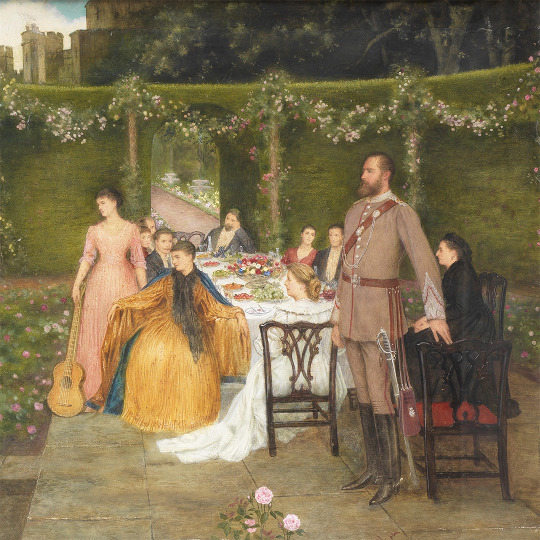
Edward Clifford, details from A Lunch Party at Ashridge House (1892). Sitters identified below.

Rt Hon. John ‘Yvo’ Vesey, 4th Viscount de Vesci (1844-1903), husband of (3)
Colonel Hon. Sir Reginald Chetwynd-Talbot (1841-1929), husband of (4), brother of (5, 7, 12, 14, 16)
Viscountess de Vesci (née Lady Evelyn Charteris) (1849-1939), wife of (1)
Margaret, Lady Chetwynd-Talbot (née Stuart-Wortley) (?-1937), wife of (2)
Countess Brownlow (née Lady Adelaide Chetwynd-Talbot) (1844-1917), wife of (15), sister of (2, 7, 12, 14, 16)
Miss Pamela Wyndham (later Baroness Glenconner; Viscountess Grey) (1871-1928), daughter of (10)
Hon. Alfred Chetwynd-Talbot (1848-1913), brother of (2, 5, 12, 14, 16)
Lady Alice Gaisford (née Kerr) (1836-1892)
Mr Harry Cust (1861-1917), cousin and heir of (15)
Mrs Percy Wyndham (née Madeline Campbell) (1835-1920), mother of (6)
George Herbert, 13th Earl of Pembroke (1850-1895), husband of (12)
Countess of Pembroke (née Lady Gertrude Chetwynd-Talbot) (1840-1906), wife of (11), sister of (2, 5, 7, 14, 16)
Countess Cowper (née Lady Katrine Compton) (1845-1913)
Admiral Hon. Walter Carpenter (né Chetwynd-Talbot) (1834-1904), brother of (2, 5, 7, 12, 16)
Adelbert Brownlow-Cust, 3rd Earl Brownlow (1844-1921), husband of (5), cousin of (9)
Marchioness of Lothian (née Constance Chetwynd-Talbot) (1836-1901), sister of (2, 5, 7, 12, 14)
#art#edward clifford#1892#1890s#yvo de vesci#reginald chetwynd-talbot#evelyn de vesci#margaret chetwynd-talbot#alfred chetwynd-talbot#alice gaisford#walter carpenter#constance lothian#and all the rest of these folks ->#adelaide brownlow#pamela glenconner#harry cust#madeline wyndham#gertrude pembroke#katrine cowper#adelbert brownlow#are within the wider circle of#the souls#🕰️#LOVE pamela with her guitar & being chaperoned by her mother#but still being painted standing next to harry cust 👀
18 notes
·
View notes
Photo

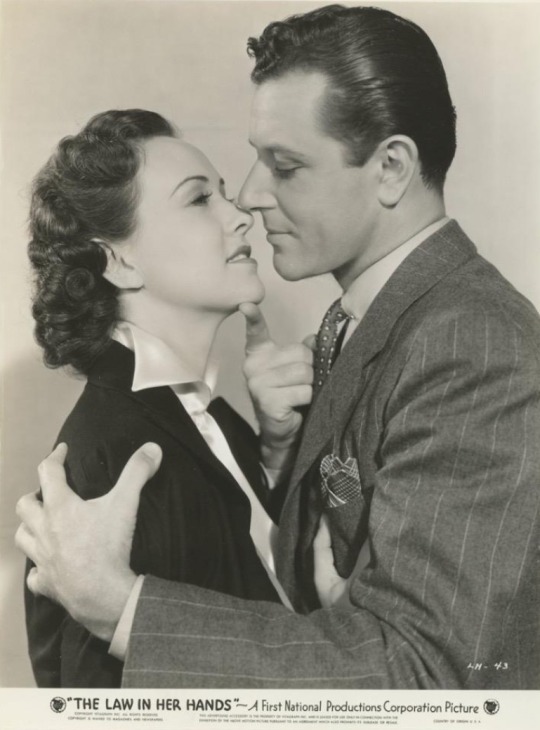

The Law in Her Hands (1936) William Clemens
February 17th 2023
#the law in her hands#1936#william clemens#margaret lindsay#glenda farrell#lyle talbot#warren hull#eddie acuff#dick purcell#al shean#lawyer woman
5 notes
·
View notes
Text
Scandal in Salisbury
Recently I had a rare opportunity to visit Church House in Salisbury. Used for administration of the diocese today, it is an attractive medieval/post-medieval building retaining many original features, and has an interesting but sometimes rather murky past. Originally it was built in the 15th century by a merchant called William Lightfoot, and was known in that era as The Falcon. However, later…

View On WordPress
#Church House#Earls of Castlehaven#Edmund Duke of Somerset#Elizabeth I#executions#Ferdinando Stanley#Henry of Buckingham#Lady Eleanor Talbot#Lords Audley#Margaret Darrell#Mary "Tudor"#Mervyn Tuchet#rape#Salisbury#smallpox#sodomy#Stanleys#Sudeley Castle#Tower Hill#William Lightfoot#workhouses
1 note
·
View note
Note
I'm a big fan of when actors cast as family members actually look like they could be genetically related.
That being said, we rewatched The Wolfman (1941) last night, and there is no way that Larry Talbot inherited Jon Talbot Sr's genetics. Claude Rains is only 5'7"! Which got us thinking, who would be Mrs. Talbot such that Lon Chaney Jr's looks make genetic sense.
We decided on Margaret Dumont. Who would you choose?
I open this one up to the people to argue about :)
30 notes
·
View notes
Note
Part Four
Thar she blows!

II. Norfolk and His Enemies
(First Half)
Ever since I became interested in history I've always believed Norfolk brought down Cromwell in revenge for Anne and George, as to me that's the most natural explanation.
To be clear, when I talk of his 'killing' them, I mean he cooked up the allegations and arranged the show trials, but was 'only following orders' as it were, and Henry is truly responsible.
I am NOT the type to whine that he was The Real Victim in all this; just a wide-eyed, gullible babe-in-arms who Jenwinlee Bleevd Ur Giltee thanks to moustache-twirling Cromwell's diabolical mind games.
But since the King can't be caught (invasion don't look so bad now), we might as well get his second in command.
It's my default assumption, and yet I've never seen it suggested elsewhere, as if it's literally impossible when 'we all know' Anne and Norfolk despised one another.
Worse, it upends two long-held lumps of received wisdom:
1. No one was bothered when Anne died (certainly not Elizabeth!)
2. Norfolk was evil and only cared about himself.
The most noble motivation anyone can accept is him acting out of rage when Thetford Priory was razed to the ground, and how Cromwell degraded the Howards by disturbing their eternal rest.
So people don't mind the idea Norfolk swore vengeance on behalf of these long-dead relatives who died in their beds, but feeling the same sense of outrage for a niece and nephew Cromwell shamed and murdered a mere four years ago is out of the question.
Yet even if Chapuys was right, there's an entire world of difference between bust-ups breaking out within close family units and some outsider taking their lives.
No one would tolerate such a blatant attack on their own kind, because it goes against every masculine instinct to defend the tribe from danger.
This Thomas Howard saw action at Flodden and in the French wars, plus the Pilgrimage of Grace and Wyatt's Rebellion: prepared to kill and be killed in defence of the country.
But now his own flesh and blood are being butchered, and you're telling me such a military man doesn't mind?
Oh no. Instead we should accept Cromwell and the Cardinal were simply perfect angels who no one could ever dislike for any respectable reason.


Regarding Wolsey, I shouldn't think this incident helped.
Norfolk was dispatched to Ireland in 1520 and took Elizabeth and the children along for the entire campaign.
As both their fathers were still alive there really is no reason they couldn't have remained at home in much more secure conditions, so perhaps wanting their company could be a sign of at least some affection for his young family.
Norfolk arrived in May but three months later:
'There is marvellous death in all this country, 'which is so sore that all the people be fled out of their houses into the fields and woods, where they in like wise die wonderfully; so that the bodies lie dead, like swine, unburied'.'
By 'marvellous' and 'wonderful', Norfolk doesn't mean it's 'nice', or that he likes it; it's his own expression of horror.
As what he describes there sounds like absolute Hell made visible; like a glimpse of the End Times playing out all around him in suffocating proximity.
The populus is rapidly declining before his eyes: people forced to abandon ailing relatives to die alone to save themselves; having nowhere else to go but resort to shivering vagrancy in the undefended wilderness; only to soon realize they too are infected and doomed beyond all mortal help.
And those coming along later, seeking safety, being met with the putrefying yet still-recognizable corpses of friends, family and neighbours; stepping through the rancid sea in hopes of finding a sheltered little spot to sit, in full knowledge it will be where they too shall die.
And the stench and the screaming and the ever-present throbbing terror of it creeping closer and closer until there's only you left to go.
'Wishes to have leave to send his wife and children into Wales or Lancashire, to remain near the seaside till this death cease.'
Well it's no place for loved ones to be, so Norfolk writes asking permission to send them off without him, therefore no royal business will be affected.
It's a rather poor show when a husband and father can't simply act immediately to protect his family, and is instead obliged to go through this insufferable rigmarole of writing and waiting, with the implication that even after the long, drawn-out silence they still might refuse.
They could be dead b' then!
'Anxiously desires a letter, 'for never sith [since] my departure from London [have] I had [a] letter from the King's grace nor you; and also to continue my good lord...'
If he's had no news in three entire months, what's the likelihood Wolsey will bother to open this particular message, no matter how desperate the situation might be?
Norfolk's grand plan isn't even to ship the wife all the way home, but for Elizabeth and the little 'uns to hide on this side of the Irish Sea, as he's intending for them to come back later.
(I enjoy thinking of him arranging their stay 'near the seaside', as if it's a holiday to Blackpool to build sandcastles and have ice creams!)
He must truly value both their welfare and company, so wants the separation to be of as short a duration as is possible, which has certain strange implications for his marriage.
Did you...did you actually love her at one point, Norfolk?
And she loved you?

In the first letter Norfolk was working himself up into a state, and here we are, one month later, and nothing's bloody improved.
'Eighteen soldiers have conspired to steal a fisher-boat of sixteen tons, go to sea, get a better ship, and turn rovers.'
In fact it's worse, as now he's dealing with mutiny and piracy—
'Victuals are so dear, the soldiers cannot live on 4d. a day.'
—Brought on by poverty and starvation, which he can do nothing about—
'Wishes he had the same authority as Dorset had in Spain, or as he has upon the the sea; otherwise he cannot keep order.'
—Because despite being marooned without news from the outside world, no one even bothered to grant him sufficient power to run the place.
'The death continues in the English Pale.'
To top it all, that stinking disease never went away—
'Has had no answer to his letters, and wants money.'
—But he didn't move the family as them heartless bastards never bloody wrote back!
He'll be tearing his hair out, man!
Damn straight, 'cause for all he knows they might sicken and die before him at any time, being:
• Elizabeth, aged about 23, heavily pregnant or recovering from childbirth;
• Catherine, aged 4 or 5;
• Henry, aged 2 or 3;
• Mary, aged under or about 1;
• Thomas, either a newborn or still expected.
Elizabeth is in a very vulnerable state and the children are young enough to be carried away by any slight chill, yet we're facing a veritable apocalypse not so much at the gates as ringing the doorbell.
This is a man whose entire first family were wiped out as if they never lived at all, and now his second wife and crop of children are in the path of some old Biblical malady that's cutting through the population like the scythe of the Grim Reaper.
Someone who's buried at least four kids WILL get jumpy at the first sniffle, regardless of severity, and you can't say he was wrong when Catherine died at fourteen.
There's also the fifth child, Muriel, about whom nothing is known, not even when she ceased to be.
But if she died right then, precisely because Norfolk never had permission to send her away, I couldn't fault any murderous urges in him.
All in all, compared to the previous letter promising life-long devotion and service—
'...And during my life, to the uttermost of my little power, I shall endeavour myself to serve and please the King's grace and you'.'
—Now bitterness over that same 'little power' and the sense of going unappreciated are creeping in to the text.
And given the mentality at the time was never to blame Henry for his own boorish behaviour, Wolsey's the obvious scapegoat.


Now between the deaths of Anne and FitzRoy comes the destruction of Lord Thomas Howard, but whereas the attainder against him arose in Parliament on the 8th of June (No. 1087), this seemingly was kept secret given he attended William's wedding on the 29th (No. 1222) and wasn't questioned until the 8th of July (above), at which point Mary Howard was also implicated.
Even if it took time to show up in the parliamentary schedule (being of a peculiar order), and so wasn't passed on the first day, whoever's pushing for it had to know it was coming long before to prepare it for the June sitting, and it sounds as if Margaret at least suspected something by warning Thomas Smyth.
(And I want to see this 'phisnayme' (the old word is 'phisnomy', as in the face) of Margaret so badly.)
The only explanation for this delay would be that Thomas was under surveillance during the intervening month, no doubt to see what else could be dug up even after his condemnation.
At a quick glance, the summons to Parliament went out before the 7th of May (No. 815), with Henry making ominous reference to the succession before Anne was even convicted or her marriage annulled (EE JENWINLEE BLEEVD!!!), and so I'd assume its list of business was mostly settled by that date, as with his fate.
If therefore he was being watched by May at the least, then no sooner were the Boleyns annihilated than the net went out again to ensnare any other related parties, and even perhaps in parallel.
Is that not...somewhat revealing?
Should Norfolk have turned on Anne and thus supported the plot against her, if merely in spirit, one would expect he'd be sufficiently secure for this never to be an issue in the first place.
For it would no longer be a case of the King's niece marrying the disgraced Queen's uncle, but affiancing the younger brother of the most esteemed Duke of Norfolk, and might even count as his reward for treachery.
It's always said that with Mary and Elizabeth disinherited and James being a foreigner, then Margaret Douglas was technically heiress, and so Thomas Howard was accused of plotting to seize the throne for himself.
But I don't think Margaret was even considered legitimate under English law, hence why she ended up omitted from Henry's will in due course.
And the attainder is in the same batch as the Second Succession Act, which is recorded as having passed on the 8th of June, with his interrogation occurring only ten days before it received royal assent on the 18th of July, alongside the Treason Act, meaning anything Thomas did before June wasn't even a crime, whilst events between June and July happened within a legally grey timeframe where either might theoretically apply, but unofficially.
(That last link doesn't even record when the Treason Act passed, as if it didn't, and was instead fast-tracked for Henry's unchallenged approval, which is all very fishy.)
Yet if the order given in the archives is correct, then Parliament condemned him (7th) before the succession (41st) even came up, and good old Henry prioritised murdering harmless youths over the security of the realm.
By their own admission Thomas wasn't trying to marry the heir, as that was still Princess Elizabeth, both when he first loved Margaret and at the exact moment they attainted him, because although her parents' marriage was already annulled, Elizabeth was made heiress by one Act and so it took another to remove her.
Instead the rumour goes (from Chapuys, so we have to tread carefully) that the purpose of this Act clearing the decks and letting Henry name anyone heir (a very suspicious clause in itself) was to make FitzRoy king, but he put the kibosh on that by kicking the bucket.
In June (No. 1069, a few paragraphs down) Euse claimed Robert Radclyffe, 1st Earl of Sussex (father of Norfolk's brother-in-law) proposed before the Privy Council that since Mary and FitzRoy were both bastards (and Elizabeth don't count) that they might as well prefer a male over a female, an idea which Henry failed to oppose.
Yeah right. That's what Sussex got told to say so Henry could put on a show of 'bravely' heeding the wisdom of his advisors by doing what he wanted to do regardless.
Adding it up, the idea Thomas was mistakenly arrested for treason, as if those behind it meant well, is utter nonsense, and he was crushed by the evil just as Anne was before him.
Come on, they've convicted him before the new law he 'broke' about marrying royalty even arrived, and which was drawn up because of this situation, as with Katherine Howard, so how can that be explained unless they purposely wanted him dead?
Interestingly, the John Ashley questioned here is probably Kat's future husband, plus the 'John Asheley' close enough to Anne to borrow £100 (No. 912), which was still on loan at the time of her murder.
I bet he coughed up sharpish.
And the 'Lady Boleyn' they're avoiding must be Elizabeth Wood, John's aunt and wife to James Boleyn, who's at her fetid tricks spying and preying upon innocent people again, as if that's her default setting.
It makes me imagine she was so notorious for her creeping, conniving ways that's exactly why they chose her to betray Anne, and I daresay she heard nothing more about this thanks to services rendered.


Isn't it a bit too much of a coincidence that this 'scandal' (No. 147) was only officially discovered after Anne's arrest, apparently, or at least, a long-standing love affair suddenly became a problem then, because somehow no one noticed it during the previous twelve months?
And THEN Mary Howard gets a mention, despite them envisioning her as the next Queen of England, and so you'd assume everything would be done to keep her out of it.
'The King is much mortified "devant mariage dicelle sa nyece;" much more because he has no hope that the Duke of Richmond can live long, whom he certainly intended to make his successor, and but for his illness, would have got him declared so by Parliament; and this was one of the reasons why he was so very urgent that the Princess [Mary] should approve the statutes that made her a bastard.'
Everyone was cast down and humiliated to smooth the golden path for FitzRoy, but no one expected him to collapse along the way.
I also wonder that if Thomas was now considered unsuitable if Mary Howard might also have been under the same shadow once Anne was gone, particularly as it was a marriage she arranged.
It's all very well a duke marrying a duke's daughter when that's the most he's ever gonna be, but if Fitzy's facing kingship it's simply not a good enough match anymore, so who knows what would've become of her.
After all, is this really much different to Lady Rochford's later activities?
'...And they have condemned to death...the younger brother of the Duke of Norfolk for having treated a marriage par parolles de present with the daughter of the Queen of Scots and Earl of Angus.'
Whilst Chapuys is only mentioning Norfolk so Charles can understand who Thomas is, doing so gives the impression Henry's outrage is firmly laid at the Duke's door.
'A statute has also been passed making it treason to treat for marriage with anyone of the blood royal without the King's consent.
The said personage of the blood royal was also to die, but for the present has been pardoned her life considering that copulation had not taken place...'
Henry was ready to cut his own niece's head off after she broke a law he invented precisely as an excuse to kill her.
I suppose in the end Mary survived just as Margaret did, i.e. non-consummation of either union, whilst Thomas was kindly left to suffer and die in gaol as a treat.
Here is an extremely sad letter from Margaret (No. 294) grovelling in gratitude to Cromwell and promising to throw Thomas's impoverished servants out on Henry's orders.
(I do hope she found the pair another home as I hate to imagine what happened to them otherwise.)
'Desires Cromwell 'not to think that any fancy doth remain in me touching him.'
I refer you to her poem from Part Two for how much I believe that.
Still, Margaret caved immediately, and no wonder with Anne's example before her, besides Princess Mary almost going the same way.
On that note, people too readily overlook the horror of Henry almost murdering his wife, niece and daughter in sequence (Anne in May, Mary in June, Margaret in July), besides his palpable eagerness to do so, as they want you to see him as a big ol' cuddly teddy bear who Didn't Do Nuffin.
But the period between May 1536 and October 1537 is much underrated in terms of all-out, no-holds-barred utter lunacy:
A queen's just been decapitated; there's no designated heir, and for half of it no sign of one; the kingdom's about to tip into civil war and a thousand years of Christianity and near enough all English art and beauty that's ever existed is being battered and burnt before their eyes.
And all those who thought time would turn back so obligingly and it'd be endless sunshine and rainbows once they brought down that pesky Anne Boleyn are coming around to the realization that's it's got so much worse without her.
The tale of Thomas, Margaret and their doomed romance may only seem an insignificant portion of it, but there's something unnerving about how it slotted together so simply at the most opportune moment, where the one remaining claimant had to be erased before the grand plan took shape.
I kid you not: the rumour at the time (No. 532 & No. 533) was that Henry wanted Cromwell (!) to be king, as he 'loved [him] so', and handed over Margaret behind the scenes like a tearful virgin sacrifice, and therein lay Cromwell's motivation to be rid of his 'love rival' forever, which also casts him intervening for her in a very different light.
EEEEEEEEEEEEEEE! Like bloody Frollo and Esmeralda!
Now Cromwell being next in line is plainly absurd, and as he didn't marry Margaret once the fuss died down, we must presume that was never his intention, unless of course the discovery of everyone's violent opposition put him off.
(And good on the boys for wanting to avenge Thomas and defend Margaret's honour.)
It's a bit much painting Cromwell as the kind of creaking old pervert who'd accept young girls as gifts, or bribes even, yet these rebels are fixated with blaming anyone but Henry for his own actions, as was the fashion.
Ironically, this is nevertheless almost the exact same charge Cromwell went down for, except then it was having designs on Princess Mary; implying Henry kept the accusation in mind for future usage.
(And that rumour supposedly went about in July 1536 (No. 41, at the end) 'cause Henry ain't got no new ideas.)
Still, imagine if we could prove the epically beautiful Margaret really was the ultimate lip-smacking prize Henry dangled before Cromwell to goad him into spilling Anne's blood.
For I can't help sensing a genuine malice to proceedings where Henry wasn't about to let anyone be happy without his permission; to the level that a quick death was deemed too good for Thomas and so he can languish alone and in pain knowing he'll never see Margaret again.
And she's too useful to squander upon the scaffold, so let her live and remember.
On the one hand, Chapuys has no reason to 'embellish' the truth these days, but on the other, how can you ever trust anything a liar says again?
But his belief in FitzRoy's imminent elevation makes more sense than leaving the succession empty for the foreseeable future, especially as from June onwards he insists Henry's gone sterile and definitely won't get kids off Jane, who's barren.
Give 'em chance to breathe, man!
He also defends Margaret, which makes a change:
'...And certainly if she had done much worse she deserved pardon, seeing the number of domestic examples she has seen and sees daily...'
That'll be a dig at Anne no doubt, yet it's in the plural, so I'd love to know who else he means.
'...And that she has been for eight years of age and capacity to marry.'
Too much information there, love.
It's one thing to observe Margaret's over the legal marital threshold, but how does he know what her 'capacity' for it is, exactly?
I'll bet he's considered Princess Mary's 'capacity' before now.
I'll bet he has. Dirty bastard.
Margaret being his best beloved's old mate makes her 'one of the good guys' and so he's willing to talk her up; ignoring she was also Anne's lady-in-waiting, friend and companion for three years and so must've been cheerfully covering for all that beastly incest that was definitely going on.
But that's alright. Obviously Anne the Slag was corrupting Margaret.
Euse is coming out of two really long months of his 'EN IZ UH HOR' routine, leading the oh-so righteous charge against 'the Concubine' and salivating over her brutal murder, not to mention rubbing his claws together at the thought of 'the Little Bastard' being disowned as the daughter of George / Norris / random peasants and slung into the streets to starve to death.
But the moment a REAL secret affair gets exposed and it's all:
Well, what d'yer expect?
According to him, if Margaret's twenty then it's only natural any woman THAT much over twelve is gonna have certain urges and want to explore them, so even if she had slept with Thomas in or out of wedlock then Henry should just get over it as it's his own fault for keeping her single.
Ooooooh, very liberal!
Yeah man, these things just happen, don't they? It's no big deal.
Anne's a whore, tho.
'Since the case has been discovered she has not been seen, and no one knows whether she be in the Tower, or some other prison.'
Not sinister at all!
Yeah. Margaret's just vanished off the face of the earth after her uncle spared her 'for the present', but that's not saying he won't change his mind.
So yer'd best watch yerself, love!
This may not seem directly related to Norfolk, but I'd have thought if he'd had any part in killing Anne that the State might have stopped persecuting his family by now.
The Jane Parker fans like to highlight her financial woes during these months as proof she couldn't have testified against George, but if so, I'd have said Norfolk witnessing his brother done for treason was a bigger vote in his favour.
Mary Howard's connection is very worrying, especially as she's chaperoned Margaret 'divers times', and is therefore more in on it than the other friends and servants, and in doing so openly concealed and facilitated 'traitors' longer than any of them.
You'd almost say she was second in command after Thomas and Margaret themselves, so it's difficult to believe she got out of it just because the couple under sentence of death covered up for her.
Had FitzRoy survived, I wonder if they'd want rid of her quietly with a nice annulment to make way for a prime foreign alliance, with this threat pushing her father to agree.
And maybe she and Margaret escaped serious punishment thanks to the scheme fizzling out altogether, despite handing Henry another excuse not to support her, as if he needed one.
I wish more attention were paid to such a blatant stitch-up, as whilst it may not be a nefarious conspiracy on par with the one that took down Anne, none of this happened by accident.


Chapuys wrote of FitzRoy's decline on the 23rd of July, meaning he was conking out at that very second.
You'd think laying him to rest might be a matter for his own father to arrange, but no!
Turns out he's too tight to even finance the burial of the bloke that could've been his heir five minutes ago, and shunts it on to someone else instead, as usual.
In the normal run of things a family is patrilineal; that's why a wife takes her husband's name and so do the children as the next generation of his 'house'.
Yet as a bastard, them rules don't apply, and the child reverts to the mother's line.
But it's as if calling him 'FitzRoy', being an invented surname bellowing his illegitimate status, specific to him and him alone, more or less cut the boy off from both sides to stand alone as an entirely brand-new dynasty that simply popped out of the ether one morning.
Yet as it only contains him, then he was almost grafted on to the Howards upon marriage to give him a group to which he belonged; that is until Mary had children to expand the surname, whereupon he'd break away and she'd join his 'kind', if you will.
But having carked prior to all that he finished life as a quasi Howard adoptee, and so into the family vault he went.
'The King wished the body conveyed secretly in a closed cart to Thedford, 'and at my suit thither', and so buried...'
Seems Henry wanted a cloak-and-dagger job where they snook the stiff down to Thetford all hush-hush and the like, specifying a 'closed cart' to hide the grisly contents from snooping onlookers, which makes it sound like Fitzy can't even got a flamin' coffin these days and got tossed not just hither, but also thither (which is important), in the nice-and-airy boot of a clapped-out Robin Reliant.
'...Accordingly I ordered both the Cottons to have the body wrapped in lead and a close cart provided, but it was not done, nor was the body conveyed very secretly.'
What a come down, eh?
One day it's all kind hearts and coronets and the next you're nowt but any old cadaver rolled up snug in Norfolk's much-frequented, cast-off dayglo hearth rug.
But yer just can't get the staff these days and once the bloomin' Chuckle Brothers get hold of 'im they bunged the boy wonder in the back of the local ice cream van (between the soft scoop and Soleros) and trundled into town blaring bloody Greensleeves luring all and sundry out to have a good gawp at proceedings.
Worst of all (No. 164), turns out Richard and George Cotton were Fitzy's out-of-work home helps who were badgering Henry for black cloth and job offers before their previous boss was even propped up on the beaded seat cover.
Chapuys's version (No. 221) is that they dumped him in a wagon and draped a load of straw over the eight-day-old corpse (eee) and just had the Cotton-Eye Joes (?) skipping along behind in full Lincoln Green like it was bloody Robin Hood themed.
'Few are sorry for his death because of the Princess.'
But that's okay as no one gave a toss about him and everyone's actually totally glad he's dead as they've also all worn themselves arthritic fantasizing about Mary sliding on to their throne.
'...And thank God she now triumphs, and it is to be hoped that the dangers are laid with which she has been surrounded to make her a paragon of virtue, goddess, honour and prudence: I say nothing of beauty and grace, for it is incredible.'
If Mary don't get a restraining order he's gonna start drinking her bath water.
'May God raise her soon to the Crown for the benefit of his Majesty and of all Christendom!'
I presume he's now referring to the Emperor, else he's saying he wishes Henry would hurry up and die as being dead would really do him the world of good.
'Even Secretary Cromwell has congratulated her in his letters...'
Watch out Euse! Yer got competition!
Whilst I doubt Cromwell, whatever he felt, would dare say on paper that he was glad Henry's only son was dead, and most likely this is Chapuys projecting his own revolting personality on to others, I'm grimly fascinated by the idea of Mary attracting all these unwanted ancient admirers who'd think Philip never had it so good.
And now Norfolk's gotta go cap in hand begging this rather macabre Cromwell for forgiveness even when the latter's apparently glad to see the back of poor Fitzy.
'I trust the King will not blame me undeservedly.'
Well think on, flower.
I don't know why the Cottons gleefully flouted instructions and risked their livelihoods.
I don't know why Norfolk would dare disobey his 'Master' and not supervise proceedings with obsessive scrutiny.
And I certainly don't know why Henry demanded all this whispered fannying about as if he was suddenly ashamed of FitzRoy's existence.
Some say this shifty attitude suggests Junior was bumped off; that because his stepfather's men joined the Pilgrims he would've done too, so Senior soon put a stop to that.
But that's silly.
First, if Henry somehow got wind of rebellion brewing months in advance I'd have thought he'd do a bit more to quell it than killing his own son, as if that's gonna help.
Secondly, he hasn't spent close to three decades gagging for a male heir simply to stuff the only one he has got.
If anything, I'd say FitzRoy could've whipped up insurrection himself and led the revolution, and Henry wouldn't have done much more than shake his fist at him.
He's not angry. He's just disappointed.
And from Fitzy's view, why bother?
He must've heard he was heading for the big time by now, so should he ever sympathise with the Cause, then all he need do is wait for Henry to pop his clogs and he's got free reign to do whatever he wants.
Yet imagine FitzRoy living, and being promised the earth; then Edward shows up.
What a kick in the teeth!
So even though this theory is absolute gibberish, I can't think of an alternative.
'This night at 8 o'clock came letters from my friends and servants about London, all agreeing in one tale: that the King was displeased with me because my lord of Richmond was not buried honourably.'
As for the oh-so confident assertion that 'everyone' judged Norfolk to be 'a twat', I marvel at how all these 'friends and servants' inundated him with warning messages then, as if they were worried about him.
Sounds like the perfect opportunity to be rid of the old git, eh? Most curious.
I suppose they're all 'twats' too.

There's another letter to Cromwell on the 6th where Norfolk's really tipping into panic after two more pals sent him word, and that's loads worse as they're sober old gentlemen who 'would not write with some ground'.
And mailing missives one day after the next is a sure sign something's up; usually you only see back-and-forth correspondence in the records once a week.
'I desire to know the truth by this bearer, who shall meet me ere I come to London; spare not to be plain to me.'
This is on Sunday night, he plans to reach London by midday on Thursday, and in that time the postman's gotta race to Cromwell and almost all the way back as he meets with Norfolk on the road to tell him what's up.
It's THAT serious.
And God bless Norfolk for riding into the jaws of Hell in full knowledge this could be it for him, as it's fairly obvious to read the gist of the friends' letters from his own, where it's not:
Ooh-ho-ho-ho-ho, you'll get a good ticking off this time, mate!
But more:
HE'S GONNA KILL YER, MAN!!!
'It is further written to me that 'a bruit [rumour] doth run that I should be in the Tower of London.'
This appears to be an unrelated topic, as the average Londoner won't know anything of the burial yet, if ever, so what's he done to deserve this?
The aggression is entirely Henry's own evil predisposition swelling up again, so the idea 'the people' are also gunning for Norfolk for no reason is far too coincidental.
An obsessive, paranoid and murderous tyrant craves insider knowledge on public opinion, especially when his own behaviour has triggered so much upheaval and ill-feeling.
Wouldn't he, in such an uncertain era, really need a fair few informants mixing in with the hoi polloi to gauge popular reaction, and round 'em up if they looked likely?
(Henry personally orders spies to prey upon and betray his people later in the year (No. 1178), so the idea is not unknown to him.)
And once we're there, what's stopping said subversive from manipulating mob sentiment for some higher (or rather, lower) purpose?
All he need do is start spreading a few scripted slanders, and when it gets around his employer can claim 'everyone' thinks it because it was spoken aloud once.
This is Henry's own personal vendetta, and whether it be solely down to his son's send-off (which he himself commanded to be as miserable and lonely as possible) or goes much further back, the idea that Londoners miraculously agree with him, and right at this very moment, meaning if he kills Norfolk it can be paraded as 'the will of the people', with Henry a merciful public servant devoted to his subjects' wellbeing, is freakishly unnatural.
'When I shall deserve to be there Tottenham shall turn French.'
Eeeeeeee! No, not that!
'I would he that began first that tale of mine, he being a gentleman, and I, were only together on Shooter's Hill, to see who should prove himself the more honest man'.
Yeah! Just you wait, lads! He'll have that meddling whipper-snapper over his knee then DUEL HIM TO THE DEATH before you can say 'Howard the Duck'.
Note he's quite sure only one fella is responsible, implying a deliberate attempt to whip up trouble, whereas a real general unpopularity would arise in many people at once as they all instinctively react to the same information.
I wonder if describing the shady figure as a 'gentleman' is a coy social nicety, or an actual belief the man belongs in the gentry with lofty connections.
If idle talk's going round London, I'd picture some loosed-tongued workman shouting the odds, or even a bunch of housewives regaling one another with tall tales.
Why then would Norfolk assume any tavern tittle-tattle was the work of a 'gentleman', which implies respectability, and thus honesty, when he could instead belittle them as a 'knave' or 'ruffian', and so undermine their words to aid his own plight?
And does the advertised threat of violent retaliation in a letter to Cromwell signify more than it seems?
After all, Norfolk made a point of saying his 'friends' were writing en masse to warn him of Henry's savage intentions, but Cromwell wasn't one of them.
Because he didn't want him warned.
As the Boleyns and the Howards were meant to all come down together.
'Your son is in good health here...'
The oft-repeated blabber of Norfolk hating Cromwell from day one never includes Gregory's madcap holiday hijinks.
'Cause it ain't enough to lay prostrate before the powerful but now yer gotta bankrupt yerself putting their kids up with bed, board and entertainment like a bloody five-star hotel now.
Yer house ain't yer own!
Is Greg supposed to be grand pals with Surrey and Bindon, and no hard feelings later?
Or are they on their best behaviour pretending to like him whilst flipping the bird behind his back?
What's Mary's opinion?
He could've snapped her up if he'd played his cards right!
Speaking of which, did Greg attend Fitzy's funeral?
Did Greg report on Fitzy's funeral?
(Well how else did Henry find out?)
Is he a spy?
Yes!
Does Norfolk know?
'Course he bloody does!
So the Duke loses three relatives to the King's ravenous hatred, and then leaves Court taking an enemy informant back home with him?
They've a taste for blood!
And for this extra-special mission, Cromwell selected the one bloke he trusts the most to be certain of the utmost loyalty and fullest correspondence; all whilst Greg feeds off the very family they're desperate to destroy.
Can't even flamin' speak yer mind in yer own gaff these days!
Greg's a knob.
'...With the hand of him that is full, full, full, of choler [anger] and agony.'
Ooooooooh, camp!
'P.S. I have at this hour finished my will...'
Bloody hell, Norfolk! We're tryna have a cup o' tea here without you bringing us all down!
The heavy postal load this evening obviously put him in a right old morbid fit, where the SHADOW OF DEATH stalks his every waking thought.
The real irony is how it gives him a mind to settle his affairs before it's too late, even when should the worst happen, the entire point is they'll be robbing him blind first.
What a feckin' waste of time that was!
'...And written it twice...'
He's obviously gotta make two in case Henry produces a substitute scratched on a beer mat where Norfolk just so happens to leave all his worldly possessions to that dear Master o' his.
But don't tell 'em there's a copy, man!
They'll be turning yer house over ter lay hands on it!
'...And shall leave one part with you as my principal executor whom I trust next [to] my master...'
So not a bit then.
'...Whom I have made supervisor of the whole.'
As a will is utterly useless where he's going, this could be an elaborate ploy for sympathy.
Come on, lads! I'm just a poor little old fella teetering on the edge of death!
You don't wanna be killing me! I'll be gone soon anyway!
Crafty sod outlived the pair of 'em.
'I trust when I die you both will consider I have been to the one a true servant and to the other a faithful friend.'
Translation:
I'm a good girl, I am!
He's both implying his passing is imminent, and so hurrying it on is an needless extravagance, but also that when it happens they'll both miss him, thereby planting the idea it will be a natural death, that it should, and must be, even, and changing that would go against the natural order.
As I peruse these letters I have the fancy that Norfolk spent a lot of time watching and observing human behaviour, and developed a fair grasp of psychology long before its invention.
In doing so he learnt the exact method of provoking pity, or at least doubt and hesitation, which bought him enough of a reprieve to survive until the political situation shifted to his advantage.
I can think of no other courtier who had THIS many close shaves but nevertheless died of old age when so many young men and women begged and pleaded for their lives and yet received no such mercy.
'Sic transit gloria mundi.'
Or 'So passes the glory of the world', as I would say.
Is this Norfolk's opinion on his own demise?
Ooooooh, get you!

Whatever he said to Henry must've done the trick as here we are on the brink of civil war, which you could say ended up saving Norfolk's bacon in the long run.
But it's not all glamour.
This link leads to one of the most densely-packed fatboy collections I've come across, which gives you an idea of the sheer pandemonium unleashed as reports start flooding in from all sides.
It feels like combing through week upon week of correspondence and it's only five bloody days, albeit five days of insanity; ranging from the fun stuff where Bess Holland's uncle John Hussey, 1st Baron Hussey of Sleaford, won't leave the house in case the rebels look at him (No. 561), to horrors beyond belief where one of Cromwell's men was ripped apart by dogs (No. 567).
I'm trying to make sense of where Norfolk came into it, but it's such a mess I haven't really got a grasp on matters.
On the 7th of October (No. 579; 2) Norfolk's to prepare the assembled forces for Henry's inspection:
'That my lord of Norfolk be sent immediately to Ampthill to exercise the office of High Marshal, and to set the army which shall be then arrived in order, that the King at his repair thither on Monday may view them and dismiss them from time to time with thanks and good entertainment.'
Sounds like when Henry got thither he expects a table of cream cakes and a flamin' juggling routine.
Then on the same day (No. 580; 2), Norfolk's designated as on Henry's defence team and must supply 600 fighting men to boot.
(Presuming I've read it correctly, do note how much bigger his protection squad is compared to Section 1's list of those to be sent north, whilst Jane's bodyguards are practically non-existent, and that hoity-toity Henry insists on being guarded by his highest ranking subjects.)
Further down, Section 5 lowers the quota to 500 men, being diminished along with everyone else's, suggesting conscripts were already hard to come by.
And now we've only got to the 8th, and Norfolk's staying home instead!
'...Received the King's letters, the most 'discomfortable' that ever came into his hands...'
He wasn't saying that a couple o' months back when all the pen pals frightened him into hysterics.
Nah, but he's givin' it good grease, where the most soul-devouring fate imaginable is not serving and dying to protect Henry VIII.
'...Commanding him to send his son with as many horses as he can furnish, and himself to stay at home.'
Daft old Norfolk's knightly pride is imperilled when it turns out he'll be missing out on all the action, as that spells the eternal pipe and slippers.
There comes a phase in any man's life when the ever-pressing flow of time compels him to pass the torch on to the next generation; to lie at rest in the twilight of his years as those youthful fresh faces make a name for themselves in his stead.
OH NO YOU DON'T!
'If he sends away his horses, can do no service in repressing the people here, nor come to the King when commanded.'
Given his role of royal attendant appears to have vanished within a day, talking of what should happen when Henry calls on him is more wishful thinking rather than any concrete expectation of such.
You never know: one snub like this and it could be curtains on his career.
Well Norfolk ain't 'avin none o' that, for he's raring to get stuck in:
'Does not wish to sit still like a man of law while other noblemen either come to the King or go towards his enemies.'
Or in other words:
Eee! There may be snow on the roof but there a fire in the hearth!
It's easy to mock, but let's not ignore Norfolk volunteering for what could be certain death at his age.
In fact he's so mortally affronted by being kept out of danger he posts THREE grumbling letters on the 8th, and to anyone who might listen.
We only get given the gist of the second (No. 602), in which he sends Surrey up to vouch for him, as if, despite all his bloody-minded bluster, he's still too frightened to meet Henry whilst in this insubordinate mood.
(Bindon meanwhile, who's all of sixteen, will not only have to take care of Mary, Frances, Bess, his own wife Elizabeth and any little children whilst his dad's away (No. 659), but the whole population and property portfolio!)
For no matter how much of a sugary-sweet veneer Norfolk paints into every epistle, the shiny façade always cracks as his overpowering resentment bleeds into his words:
'My lords of Oxford and Sussex might have stayed [in?] this country as well as the writer.'
It's either 'stayed' as in they're just as qualified to keeping watch over the area as him, therefore don't pick on Norfolk for all the boring jobs.
Or 'stayed in', by which the Duke suggests they too be retired from service when they're both a decade younger than him.
The 'as well' I suspect doesn't signify 'alongside', where Norfolk wants some company, but more that they're 'as fit' and 'as suited' to be left out, and that they haven't been, with two earls preferred over a duke, smacks of naked favouritism.
Sussex was the one chosen to suggest FitzRoy be the next king, which in itself implies Norfolk knew nothing of the scheme for all that it concerned his own daughter, although perhaps it wouldn't have done for long.
As for John de Vere, 15th Earl of Oxford (Surrey's father-in-law), well to this day the De Veres are remembered as ardent Lancastrians who stood by Henry VII, whereas the Howards didn't, so I wonder if Norfolk believed his grandfather's unfortunate loyalties were being dragged up again as an excuse.
In the sense that, when someone falls from favour, everyone 'suddenly' remembers old missteps and long-held animosities to pile upon the victim and bury them beneath.
Well if the 1st Duke destroyed the family in battle, whilst the 2nd restored them to glory, then the only way for Norfolk to get 'em out of this current situation is to charge in when the chance arises and hope he either succeeds or at least goes down fighting like a hero, where his sacrifice can't make things any worse.
Besides, this will be Surrey's first taste of war, and we shouldn't discount any fatherly urge to keep a boy company as he steps into manhood, teaching him and helping out if he falls into danger.
And yer gotta maintain an eye on your own fine fleet of stallions, as I wouldn't trust them bastards to ever give 'em back.
'Unless he hears again by Tuesday night, will rather set forward to the enemy, though he has only 40 horses with him, than remain at home with so much shame.'
Whilst selected to serve Henry originally, when it comes to disobeying orders Norfolk opts for the more lethal option, and will simply turn up for a fight anyway, as I suppose that's the best way to show defiance and yet not cause offence.
(With him taking that many steeds off the property I'm envisioning Bindon and the birds trapped in the house until he comes home!)
Now Norfolk's birthdate is given as the 10th of March 1473, making him sixty-three at the time these words were written.
You'd therefore assume this is Henry's uncharacteristically gentle hint of nudging Norfolk into retirement, and it's about time the younger lads like Surrey earned their spurs to prepare 'em to take over full-time in the future.
(Two days after this letter, for example, is one from William Howard (No. 636) fretting about pestering his mam to supply soldiers to fill his quota.
And I daresay the other Thomas Howard would've been summoned alongside him, had he not just been inconveniently sentenced to death.)
But THEN you have to consider that, if he's past it by 1536, what the bloody hell was Mary doing dragging him out in 1554 at the grand old age of EIGHTY-ONE to take on Wyatt's Rebellion, when he'd just done a six-year stretch inside and was well out of condition?
So how much of this is Henry's entirely reasonable expectation that his army comprise the fittest men available (Surrey's nineteen) and how much is a personal animus towards the Duke, mere months after they've almost fatally fallen out?


The day before this (No. 576) we get yet another dispatch of Chapuys's best gossip-mongering, if you can trust anything from him.
It certainly would make a change to be able to quote another ambassador and thus assume they're telling the truth; rather than needing to comb through each and every syllable to work out what the motivation is this time.
Given his willingness to enter into private (and, as he imagines, revealing) conversations with Norfolk and Cromwell, he necessarily needed to maintain at least the bare minimum of civility towards both; but from his comments he seems to actually like them, and so one would assume these reports were essentially truthful.
But I can't believe that!
According to Chap, Anne's all-consuming obsession in life was to kill Katherine and Mary and then cackle maniacally as she bathed in their bluest of blue blood, and yet The Bitch just never got round to it, for some reason.
Cromwell however, is pathetically devoted to Mary and The Cause (having strangely never shown it during the previous decade) and telling her (No. 1110) it's a pity she can't be put to death is as friendly as it gets.
When Anne apparently toyed with marrying Mary to Surrey (a future duke) this was sheer vindictive evil, as no way would espousing her to gutter-dwelling filth like that be acceptable.
But when there's a rumour Henry wants to give her to Cromwell, that's fine as Chapuys simply won't credit it; and Crom's such a top bloke he'd clearly refuse any such offer regardless
He Knows His Place.
When Elizabeth merely existing deprives Mary of her title, it's the crime of the age; and now Anne's dead the long-for happy ending is here at last when Cromwell lies about Mary being declared princess and sole heiress next week (No. 1069, all the way through).
Yet when she isn't, suddenly it never mattered at all as 'princesses' are an entirely alien concept that don't even exist in England (No. 219, second paragraph) and so who actually cares about these meaningless baubles?
Then for Norfolk, we all know how he really worshipped The True Queen and is famed abroad as a 'powerful friend' to Mary (No. 1212), and he WOULD have betrayed Anne eventually, but the chance just never came up.
And even if he vowed to crack Mary's head open (No.7, a long way down), this is such a complete non-issue Chapuys buries it within mountains of text and never brings it up again, so how can it be true?
With Henry, Euse's saccharine lovey-dovey dross on how Mary's never been better treated and how Daddy dotes on his icky-wicky best girl is habitually interrupted with the odd reference to Henry sharpening the axe, but you've gotta accept these little personality quirks, eh?
One informant even tries to tell him Henry was openly nasty to Mary and brought 'a dram of gall' into their conversation (No. 41), but he defends it as a 'father's authority', which they ought to 'condone'.
So how can we say Chapuys's pathological hatred of Anne was her own doing for treating Mary so 'badly', when he does nothing but excuse reported ill-treatment when it's done by anyone else?
Somehow in three years Anne couldn't bully Henry into killing her, and yet the moment she's dead Henry freely elects to do it himself, for he don't faff about.
And that's after Chap heard Henry was slinging snot around over the 'accursed whore' plotting to poison Mary and Fitzy (No. 908, a bit down), but what's wrong with the wife 'avin a bash first?
So whilst Anne lived, everything was all her fault, but now she's dead, things 'just happen', as it's no longer convenient to hold anyone responsible.
Although I don't see Chap rising to his former frothing glory again, he's too comfortable spinning the blackest of black fantasies to quibble over slipping in a few white lies whenever he wants, and so the day will never come when he proves an honest man.
'He has sent for the Duke of Norfolk, although it was rather against the grain, for he has been somewhat angry with him at Cromwell's suggestion, and it was said that he was half-banished the Court but urgent necessity has caused him to be recalled.'
Euse claims Norfolk was 'half-banished' from court thanks to Henry being 'somewhat angry with him', but then again it was an entirely synthetic emotion felt 'at Cromwell's suggestion'.
Eh?
Reading these archives has ruined my ability to tell the difference between sincere appreciation and the more oily end of buttering 'em up, as when Norfolk wrote to Cromwell in September (No. 470) offering him 'a million of thanks for [his] pains in [the Duke's] affairs', you'd almost believe Cromwell was the great champion who smoothed things over with the King and saved Norfolk's life.
Then here, if Cromwell's egging Henry to hate him, suddenly he's the shady puppet master working behind the scenes with his hand up the Aris like Jim Henson on Miss Piggy.
Every retelling of this relationship is always Norfolk's one-way stream of flowing hatred, with not a word on if Cromwell reciprocated.
But given what we've seen, maybe there really was something to Chap's claim (in Part Three) that Cromwell promised to 'lower the great ones'.
...Today he [Norfolk] has dined with the Bishop of Carlisle [John Kite], and they have done me the honour to send for my wine.'
Norfolk: "How 'bout a swift 'alf, here, lad? I'm gasping."
Bishop: "No go, mate. Me cellars are drunk dry."
Norfolk: [Pause]
Norfolk: "You really need to see someone about this, love."
Apparently Norfolk wanted to beat Mary to death, and yet it's still a bloody 'honour' when he raids yer drinks cabinet!
'Immediately after dinner he left in great haste for Norfolk...'
Yer can't have time ter bloomin' disgest here!
'The Bishop tells me the Duke does not think much of the said commotion—'
Heh!
'—And believes it will be easily remedied, saying that the rebels cannot exceed 5,000 men.'
Well that's a laugh: eyewitnesses are putting it at eight times as much.
'The Bishop has also sent to me to say that he never saw the Duke so happy as he was today...'
Flitting around with a spring in his step and a song in his heart!
'...Which I attribute...'
Chapuys hasn't spoken to Norfolk, Cromwell, Henry, or even the Bishop directly, therefore the excerpt is based on second-hand testimony at best, and what follows is merely guesswork; spinning events to suit his own warped worldview of how they should be.
'...Either to his reconciliation with the King...'
He can't even keep to a single narrative in the same story!
How can it be that Henry's finally let bygones be bygones and we're all pals now, when calling him to court was 'rather against the grain', where Henry begrudgingly accepted it as an 'urgent necessity'?
...'Or to the pleasure this report itself has given him...'
And now Norfolk's so unhinged news of violent rebellion is music to his ears!
'...Thinking that it will be the ruin of his rival Cromwell...'
Describing Crom as a 'rival' implies their enmity was a well-known feature of court life, and therefore both knew their (presumably) mutually penned flattery was all a game of dancing about the truth.
So you're pandering to an enemy to survive, and they know it's wholly insincere, yet you do it anyway!
And they do it back!
'...To whom the blame of everything is attached, and whose head the rebels demand...'
Here's an example of where Chap's cock-eyed view leads into yet more of his smug fantasies.
He's adamant Norfolk's cheering for the uprising on the sly, as that fits with the ever-present insistence that ONE DAY he'll ride to everyone's rescue (you'll see!), whereas Howard protests he's dusting off the broadsword and begging to give 'em Hell personally, and indeed objects to missing out on the fun.
If the Duke longed for regime change so badly, he would've waited at home as Henry ordered him to, not risked his life charging into the fray, but supposedly he's peering into a golden future where the Pilgrims do all the dirty work of killing Crom whilst he picks up the pus-plagued pieces of Halibut's hairy heart.
Henry VIII: "WAAAAAAAGH!!!!!!!!!!!"
Norfolk: "There, there. I'll look after you now."
Henry VIII: [Sniffs] "Hold me."
Norfolk: "Only if you hold me."
Problem is that Henry's a puffed-up sanctimonious berk who starts ree-ing himself silly at the mere mention of heeding those howwid plebs, and reportedly said 'he [would] not forego my lord of the Privy Seal for no man living' (No. 1042), so the only way Crom's getting culled is if the rebellion grew so powerful Henry's own throne was endangered, whereupon he would be obliged to do as told.
And in that situation, if Norfolk hasn't perished amid the onslaught then he'd soon find himself banged up and beheaded for failing to settle the unrest earlier.
Therefore, if he's in any way cheered by the news of war, it's on the hope he can reclaim all recently lost favour by putting down the danger, no doubt with the misty-eyed memory of his father's return to glory in mind.
'...Also that it may be the means of stopping the demolition of the churches and the change in matters of religion, which is not to his mind.'
Norfolk never lets up telling everyone how fervently he holds to Henry's own personal theology; to the extent he has no opinion of his own barring the one Master grants him this week.
And yet everywhere he goes, and no matter what he says, they all refuse to believe he's anything but the valiant Catholic warrior come to purge the land of heresy!
It's like they're pushing the old Duke down into the pit of martydom whilst he's still clinging on to the door frame.
'It was because he declared a part of his wishes in these matters that he incurred the King's displeasure.'
If there's one thing Norfolk ain't doing it's spouting the odds about religion, especially when he's only just dragged himself back from certain death, but pretending he would suits Chapuys and his bizarre hero fantasy, although you can tell it's nonsense straight away.
We know Henry really took the bloody hump because of FitzRoy's funeral, with perhaps some lingering resentment of the entire Howard clan thrown in for good measure; otherwise you'd have to believe he somehow forgave it, and Norfolk returned to court, only to be kicked out immediately for mouthing off.
As if!
And how can he have spoken so boldy if Henry didn't mind in the least until Cromwell suggested he find it offensive?
Not that I credit that either, for it's not as if the old git ever needed help blowing his top, and he certainly doesn't hold back on Norfolk once Cromwell's dead.
'The Duke was one of those whom the good lord [Thomas Darcy, 1st Baron Darcy de Darcy] of whom I formerly wrote, counted as willing, when occasion required, to defend the cause of the Church...'
Leave him alone!
Why are they all determined to drag Norfolk into their own whipped-up daydreams of treason?
'...Though he did not rely much upon him, considering his inconsistency.'
I'd say he's been remarkably consistent in wanting to keep out of trouble.
What they mean is it's always a surprise when a stroppy, over-emotional pensioner fails to live up their vision of an iron-willed, steely-boned Roman Catholic juggernaut crushing all heretical challengers, which they've chosen to project on to him.
'The King does wisely in using every effort to remedy it, otherwise all would go to ruin; yet there may be a danger that when the King has assembled a number of men, several may pass over to the rebels, as 500 have lately done whom the husband of the mother of the Duke of Richmond has raised.'
First Henry hates Norfolk, and booted him out the castle when the latter played his face once too often.
Then Henry's obliged to recall the Duke to save the kingdom, but only when pushed to the extreme, and moans about it constantly.
Now suddenly Henry's doing all he can to woo Norfolk back to his side: bowing and scraping and letting everyone know who's really running the joint.
And even though Norfolk's apparently made it plain how much he objects to the Dissolution, and consequently is open about his rebellious leanings, the best way to defeat 'em is to put a confirmed sympathiser in charge of the army!
Not only that, but as well as being led by a potential traitor, all the new recruits are liable to switch sides too!
What could go wrong here?
If Chapuys is such a inconsistent loon he's staggering from one self-contradictory barmpot assertion to the next, and all this from a brief snippet of his usual waffling reports, then how can he be trusted on anything?
Look at the timeline:
• 5th of October: Norfolk answers the summons and arrives at Court.
• 7th of October: Norfolk gets fed by a bishop and goes home to prepare; and also has his name put down for bodyguard duties and assembling the lads.
• 8th of October: Norfolk opens a letter ordering him not to come back.
That messenger must've been hot on his heels for the rejection to hit him so quickly, as if Henry changed his mind the moment Norfolk set foot out the door; which would therefore mean the Duke wasn't so essential upon reflection.
Well what was the bloody point of all this then?!
Henry don't even want him fighting he hates him so much, and hang the country.
Unless it's supposed to be that the moment Norfolk left, Cromwell set to work persuading Henry otherwise, which if so, was an imbecilic turn for the pair of 'em, as obviously the sensible thing to do is propel Norfolk into the heat of battle.
Not only does that ensure you've got the best man in charge of a situation, but he'll probably die doing it as a bonus, and thus save everyone the bother.

Right at the end of Chapuys's excessive babbling (not that I can talk) is a rather interesting little anecdote:
'I forgot that the Duke of Norfolk had requested the Bishop of Carlisle and a merchant here to get some rich merchants of London to buy a great quantity of cloths which were here; otherwise it would compel those who made the cloths to dismiss their servants, who would pass over to the rebels.'
Norfolk himself references the cloth-making in his third letter of the 8th, meaning Chap actually told the truth for once.
Well so much for 'snobbery', as follow that brain-dead analysis and you'd expect Norfolk never to give the welfare of the lower orders a moment's consideration.
Except his first move in putting an end to rebellion isn't going on the attack, but assisting the poor and providing employment, thereby fulfilling his main role as a nobleman.
Rather than dining with the Bishop constituting one last day of peace before he rode into chaos, turns out that slap-up dinner was in fact a preliminary business deal trying to if not calm the situation, then at least prevent it from spiralling out of control.
The idea is if there's a sudden mass order for clothing, then all the suppliers will be rushed off their feet, and not only need the current staff to work non-stop, but might even recruit more to meet the deadline, and in doing so keep yet more fellas occupied.
'The Bishop has promised to lend 5,000 or 6,000 ducats to one of the said merchants to be spent on the said purchase, and I doubt not several other bishops will be compelled to do the same.'
The clergy are specified to have lent the required funds, meaning someone will need to reimburse them all at a later date, and yet once given, they can't get it back from the clothiers.
Would this mean Norfolk nagged the Bishop to turn up his purse as a patriotic duty, one which the King would look kindly upon and pay him back in reward, being a promise Norfolk could never really guarantee?
Or is the Duke himself pledged to repay the debt, given it'll ultimately increase his chance of survival?
Well he does reference his money problems quite a bit once in the thick of the action: how he had to supply £1,500 of his own, including digging into his own pension to kit out and pay the men (No. 800), so this may be a further complication.
I am truly baffled at how he came to be remembered as this stiff, snooty caricature far removed from the harsh suffering of everyday life, when unlike Anne, he doesn't even have a hostile observer blackening his name for posterity.
At least he understood most of the rebels won't be fiery zealots but poor people driven to desperation, and so the best and most humane way to scupper unrest is to alleviate the very hardship that drove them into take up arms in the first place.
That in turn ensures more men remain alive and we don't have a sudden surge in widows and fatherless children sinking into beggary, theft, and future violence, and so contributes to the common good.
And I bet this budding plan somehow got back to Henry's ever-eager lugholes and that's why the Duke ended up kicked to the kerb, as his way of doing things was just too bloody benevolent.
For contrast, Henry's letters of the time read like nutcase anti-monarchy propaganda: wailing at the sheer affrontery of the vile plebs having the audacity to question their supreme betters (No. 780; 2)—
'Never heard that princes' counsellors and prelates should be appointed by ignorant common people nor that they were meet persons to choose them.
"How presumptuous then are ye, the rude commons of one shire, and that one of the most brute and beastly of the whole realm and of least experience, to find fault with your prince for the electing of his counsellors and prelates?"
Thus you take upon yourself to rule your prince.'
—Ordering Brandon to visit genocide upon entire settlements, right down to the children (No. 780)—
'After this, if it appear to you by due proof that the rebels have since their retires from Lincoln attempted any new rebellion, you shall, with your forces run upon them and with all extremity "destroy, burn, and kill man, woman, and child [to] the terrible example of all others, and specially the town of Louth because to this rebellion took his beginning in the same."'
—And chiding Norfolk for showing too much mercy when he ought to be chopping 'em up and decorating the town with their mutilated body parts (No. 479):
'We approve of your proceedings in the displaying of our banner, which being now spread, till it is closed again, the course of our laws must give place to martial law; and before you close it up again you must cause such dreadful execution upon a good number of the inhabitants, hanging them on trees, quartering them, and setting their heads and quarters in every town, as shall be a fearful warning, whereby shall ensue the preservation of a great multitude.'
But Ee Nevah Lost Duh Luv Ov Duh Peepull, dontcha know!
Whilst I am glad Anne's charities are given greater publicity as the years go by, it'd be strange indeed if she was the only one to care.
The Pilgrims themselves also have nothing but good will towards the Duke (No. 1371):
'Every where the people are very sorry for their offences against the King, and right joyous that the Duke of Norfolk shall come amongst them to do justice to the poor.'
Do justice, eh?
So he wasn't famed as a peasant-hating brute in his own time, then?
One of the rebels' core motivations is to 'purify' the nobility of all low-born sorts like Cromwell (No. 705 & 705; 4) and only be ruled by genuine aristocrats, so they take to the Duke as right up their street.
But because it's Norfolk, every positive you find is always twisted and distorted through the most negative lens; and so his plan will be mocked as an entirely selfish act to make his own job easier.
Even if that were true, and we can never know if it is, isn't this still the right thing to do?


'Since my coming to this town I have learned that light persons rejoice at this business in Lincolnshire, and that if I had not come, and the proclamation for clothmaking [not] been made, "some business might have chanced".'
And if Norfolk wasn't right all along!
Consider: he plotted this manœuvre on the 7th, and we're only in the 8th now, so the job offers went out at the earliest opportunity, and it was still a close call, as the blokes were packing their pitchforks when he rode into town.
'Sir Thomas Rushe, being sick of an ague, has written that the young clothiers are very light.
I have sent to him for particulars.'
Gimme them names, Tommo!
'...After the tales shown me here I dare not leave these parts without the King's command...'
Since he can't employ everyone, Norfolk's perching nearby to keep an eye on 'em instead.
I like how carefully he frames this as the strong, unbroken soldier, standing firm in eternally unblinking vigil, where nothing but the siren song of his King could ever draw him away—
'Notwithstanding my letter to you from Esterford...'
—When this follows him acknowledging he's only there from defying Henry's orders in the first place—
'...Nor send away my son with my horses...'
—And precedes disobeying them yet again by refusing to part with Surrey and his steeds.
'I think I had much wrong offered me to send my son and servants from me...'
Still going!
I know it's the same day, but it feels so long ago, based on scrolling.
A senseless daughterly pride comes over me when Norfolk's usual 'faithful minion' mask slips and he ventures to criticize Henry in print, in full awareness of the vengeful beast his prodding, as then I know I'm not wrong about him.
I especially like that this example concerns his loved ones, pets and dependents, and maybe I was right to suggest he worried for their safety and couldn't bear Surrey to go to war without him.
'In any other place I could be ready at a day's warning, and would, my lord of Oxford being sent down, leave these parts in good order.'
COME HERE, DE VERE!
I suspect he intensely disliked Oxford, despite having Frances waiting at home, given he specifically objected to the royal favour shown to him earlier and seems to want to force Henry to bend and soothe his injured honour by publicly demoting Oxford to guard duty.
Well before the 15th Earl inherited he heavily associated with his cousin the 14th Earl (another John de Vere), and deliberately sowed discord between the latter and his wife Anne Howard, Norfolk's sister.
According to Nicola Clarke (page 178):
'Out of all of [the 14th Earl of] Oxford’s bad habits, Anne was most disturbed by the company that he kept, notably his cousin and heir, Sir John [de] Vere [the 15th].
Vere was fifteen years older than Oxford and appears to have had considerable influence over him – Anne wrote that ‘my lord wyll do nothing without the counsel off Sir John Vere’.
He stood to inherit the earldom unless Oxford and Anne produced an heir and was understandably keen to do so.
However, the way he went about ensuring this was akin to bullying.
Anne wrote to Wolsey that ‘they [Oxford’s friends] care letyll ffor hys comyng forward so the inherytannce meyt be saved for Sir John Wer hath spoken largely to my fface’.
This suggests that Oxford’s friends, led by [De] Vere, were actively stirring trouble between him and Anne so that they might not produce an heir.
Unfortunately she does not specify how they went about this, but her complaint and continued childlessness suggest that they were successful.'
Anne thus turned to Norfolk for help (page 180):
'Later in the sequence of letters she also mentioned her half-brother Thomas, later 3rd Duke of Norfolk.
Somewhat unusually, the male relative most active in her cause was this half-brother and not her father.
Though [Barbara] Harris has shown that it was normal for a brother to take on the care of his sister once their father was dead, Anne’s father was still alive when her half-brother began to do this.
This was probably because her father was in his eighties and had retired from public [and] political life by this point, allowing his son and heir – Anne’s half-brother – to take over many of his former roles.
Clearly this applied to familial as well as political concerns.
There are no surviving letters from Anne’s father, Thomas I, relating to her problems, and when in need of succour on at least two occasions she was sheltered by her half-brother Thomas II and not her parents.
After their father’s death in May 1524 Anne’s brother — now Duke of Norfolk — went to some effort to continue to place the matter before the King despite spending most of 1523, Anne’s worst year, away as Lieutenant of the North.
This shows how important women’s marriages remained to their natal families.'
Frances might be a good girl, but that doesn't mean Norfolk didn't still hold a grudge against the father for effectively ruining his sister's life and depriving her of children.
If so, I can't think he wouldn't also resent the open persecution, vilification and murder of Anne and George Boleyn even more powerfully.


Once Norfolk gets neck-deep his supposed assumption the problem could be 'easily remedied' reads like those eager boy soldiers who believed the Great War would be 'over by Christmas', and his gung-ho, last-action-hero belligerence rapidly disappears.
'Having received the letter enclosed, the only only one from my lord Steward [George Talbot, 4th Earl of Shrewsbury] since Monday last, though I have several times written to him...'
Sixteen years after Ireland and he's STILL fretting when there's nowt in the post!
Nothing gets passed Norfolk, eh?
The moment events unfold elsewhere and he'll pipe up as if a big party's going on in secret and they're all joining conga lines without him.
A bit o' communication wouldn't go amiss when yer tryna put down an insurrection!
As it's unlikely both Wolsey and Shrewsbury were bent on scuppering his missions for no reason, I amuse myself picturing them all dreading a conversation for fear of provoking his 'hard done by' speech.
You know the type: no matter how wretched your life's been, they've somehow always had it worse.
Thomas Boleyn: "I've lost my wife and almost all my children."
Norfolk: "You have?! What about me?!"
But if they can't match your sufferings, if you've lost a leg and they haven't, they become irrationally furious, belittle your experiences and tell you to 'get over it', as it puts their minor ailments in the shade.
Elizabeth Howard: "Have you heard? Our Mary's husband caught the Sweat and died screaming in agony."
Norfolk: [Puce]
Norfolk: "—Well he didn't have it as bad as me!"
It does make me laugh envisioning an old codger like Norfolk, popular remembered as a heartless, cold-as-ice block of granite, lacking every softer sense or feeling, to actually be a self-pitying martyr figure who could clear rooms just by opening his mouth.
'Whatever happen, I shall not spare "the little poor carcass," or give cause to object any "lageousnes" in me.'
I can hear yer knees creaking from here, man!
And though he's despised by modern readers for his seemingly craven obeisance towards Henry, in reality we veer back and forth between Norfolk boldly ignoring commands and rushing into danger, to this timid, somewhat hysterical correspondence implying he was truly frightened of him.
'I beg you take in good part whatever (at the advice of others) I may promise the rebels...'
He not only 'begs' the King to 'take in good part' (i.e. both graciously accept and more or less honour) the deal he makes, but is so afraid Henry won't he stresses it'll all be done 'at the advice of others', as in the entire group thought it a fair offer so please don't punish him.
There's a panicked tinge of pre-emptively throwing 'em all under the bus whilst running away screaming, but also a trembling attempt at coaxing the King into agreement; for if they all consented it can't be so terrible.
'..."For surely I shall observe no part thereof, for any respect of that other might call mine honour dystayned, longer than I and my company with my lord Marquess may be assembled together;" for I think no promise made to serve you can "dystayne" me, who would rather be torn to pieces than show cowardice or disloyalty.'
Then comes a frantic spill of words promising he'd never ever do a dishonourable deal (honest, guv!) and whatever turns up MUST be good 'cause he wouldn't have stood for it when he's SO LOYAL and would DIE DIE DIE and DIE A HORRIBLE HORRIBLE DEATH before he wussed out of anything DON'T HIT ME M'LORD!
'If it chance me to miscarry, be good to my sons and daughter.'
And to really hit home, he plays for sympathy by throwing in His Dying Wish that Henry take care o' the kids!
OOOOOH! Rub it in why don't yer?!
The notion Henry would 'be good' to anyone is an open frollick into fantasy (consider recent events!) and especially ludicrous when he kills Surrey as his dying wish, and is refusing to support Mary even as they speak.
But absent of hindsight, it sounds likes Norfolk really did believe death was fast approaching, and at the hands of the mob to boot, meaning his reference to being 'torn to pieces' isn't mere hyperbole, but a fate he fears may very well come true.
And with the hours ticking down, he worries what would become of the children without their father there to protect them.
'If my lord Steward had not 'advansed' the Trent till my coming I might have followed the effect of my letter from Cambridge, and the traitors might have been easily subdued.'
But old habits die hard and he can't resist finishing on a good moan on how this would all be over if only they'd bloody listened to him!



Let me tell you, these reports on the Pilgrimage of Grace are so bloody boring.
Between uniform reiterations of the rebels rising, sinking, rising and sinking, coupled with Henry's all-to frequent reaches for the extra-strong smelling salts and pathetically inflated threats to charge in there with the Royal Army next week (he so would!), it's a blessed relief when news comes in from Calais of blokes fighting over a cow.
The single gem in the compost heap is Norfolk's highly emotional observations, which at least give a bit of fun and colour to the situation.
I'm still in October I'm that slow, but I had to include the above delight, which is much longer than the Duke's usual correspondence, dealing as it does with his severe nervous breakdown.
'I came to this town [Tuxford] this night late, and found the scantiest supper I had many years.'
Eee, there's slim pickings here, lad!
I bet he's at that hallucination stage of dreaming Brandon's a piping-hot, juicy meat chop bathing in gravy, as that's how he looks normally.
'I am weary with anxiety and have been in bed three hours, during which time I have been twice wakened...'
I'm tryna 'ave a bit o' kip here, yer bastards!
'...Once with letters from my lord of Suffolk, and again with letters from the King of the 27th inst.'
Four days ago he was lying there right as rain, hankering for Talbot's talk to interrupt it.
Tonight he's on his last legs and NOW they bother him.
'I have served his Highness often without reproach...'
Here's a lesson on how a carefully-placed comma makes the world of difference in meaning:
• 'I have served his Highness often, without reproach...'
• 'I have served his Highness, often without reproach...'
This year it's been nothing BUT reproach, which is why he risked getting involved in the first place.
'..."And now, enforced to appoint with the rebels, my heart is near broken"...'
'Enforced', he calls it, after not taking 'no' for an answer and turning up uninvited.
'...And yet every man says I never served his Grace so well as in dissolving the enemy's army without loss to ours.'
Whilst 'forced' into this most unpleasant situation totally against his will, being bent, broken and bewildered, nevertheless the tough old soldier walks ever on for his master, and indeed suprises all with his heretofore untapped genius; just like the hoary-haired immortal Crusader guarding the Grail before Indiana Jones turns up.
(And don't take his word for it, but heed the newfound fanclub.)
Norfolk missed his true calling touting door-to-door vacuum cleaners he's such a well-oiled sales machine.
'I am unquiet as to how the King will take the despatching of our band.'
Fear's fuelling the aforesaid puff piece.
'"Alas, that the valiant heart of my lord Steward would not suffer him to have tarried about Trent...'
He speaks of a 'valiant heart' whilst describing events as if Talbot did a runner.
I love the sarcastic gumption of this amusingly embittered O.A.P. flinging blame and insults about when the war's barely begun, which is either evidence of Norfolk's general doom-and-gloom view of life, or a sign the fight really could've gone badly for him, hence his concern for the children.
And implying Shrewsbury's a coward, thus not fit to lead anyone, is serious stuff amongst men of honour, so I bet he didn't like him either.
It's Percy's father-in-law an' all, and had it not been for Mary Talbot we might have pulled off a marriage with Anne instead, and she'd still be alive.
'...But with his fast hastening forwards to bring us into the most barren country of the realm...'
Obviously Shrewsbury just doesn't know what he's doing, eh? 'Cause it's all his fault we're gonna starve.
Not mine!
'...Whereof hath ensued the effect that I saw long afore would fall."'
See? I told yer this would happen, me being an expert and that; but would anyone listen?
As if!
'It was not fear which made us appoint with the enemy, but the cold weather and the want of room to house more than a third of the army, and of fuel to make fires.'
Well we would have destroyed the rebels, and don't go blaming the lads ('cept Shrooz), but it's a bit parky out and me rheumy old bones can't 'ack it.
Citing low temperatures and absent lodgings buys Norfolk time as these are easily overcome; whereas a general lack of morale within the ranks equals inevitable failure.
'Pestilence in the town was fervent, and where I and my son lay, at a friar's, 10 or 12 houses were infected within a butt's length.
On Friday night the mayor's wife and two daughters and a servant all died in one house; nine soldiers are dead.'
Shoddy Shrews has walked 'em into the cesspit of Hell to boot, and who's Norfolk got for company but his own beloved son and heir?
Yer killing me kids here, man!
Useless, eh? If only a more qualified leader was in charge.
Remember this is the same Norfolk who (supposedly) brushed off the threat of rebellion as a minor inconvenience; but by the close of the same month his hopes have sunk so low he's lining up one excuse after another as a pre-emptive defence plan.
So far nine men are dead, and more may follow, which is lengthening odds that weren't too favourable anyway, at least not by Norfolk's interpretation.
'There was not within five miles of the town one load of hay, oats, peas, or beans left.
It was therefore impossible to give battle or to retreat, as we had no horse and they all the flower of the North.'
In short, the men are cold, homeless, diseased and on the verge of famine, besides having no means of escape, whether that be onwards or withdrawing.
Thus they are trapped within an enclosing sense of rotting, agonized death, just as Norfolk was back in Ireland.
And though I've adopted the most cynical reading of his complaints, no doubt he is thoroughly enraged by the disaster to which Shrewsbury's led them, whether that's fair on the latter or not; as if they don't die now, the enemy will pick off much of the staggering remnants, with Henry culling even those few survivors.
Can you imagine that jumped-up, prissy bed-wetter facing even a fraction of what these poor conscripts are enduring?
Compare Henry's tone-deaf, supercilious lectures on the inferiority of peasants to Norfolk's generous description of the rebellion as 'the flower of the North', for all they pose a threat to his life, to see who was the better man.
'Never prince had a company of more true noblemen and gentlemen, "yet right few of soldiers but that thought and think their quarrels to be good."
Those who came with my lord Marquis and me would have done their parts "and the noblemen of the rest, but I fear what the others would.'
So the nobility and gentry, i.e. those brought up to serve and not cause a fuss, are bearing up under the strain; but the farmers and the workman gathered without warning are prone to aggressive outbursts.
Shoving thousands of untrained young fellas from across the country together was always asking for trouble; but Norfolk suspects his fellow captains haven't got the skill to keep order, making certain undisciplined divisions liable to mutiny or desert.
And who could blame them?
'My Lords, what case we were in when Roger Ratclyff and I wept secretly together I report me to you.'
Imagining a pair of frightened elderly men desperately clinging to one another and crying fills me with such sadness.
Especially as they broke down and briefly confided in one another, before resuming their roles of stoic, ever-positive leadership to avoid unsettling the troops, which I note includes Norfolk venting his distress in secret, and therefore sparing Surrey the worry.
'Neither of us both, but with good will would have [to?] be prisoners in Turkey to have had it at the point it is now, though not as we would it were...'
I'm not sure what this says: that's it's as bad as a Turkish prison, or worse, or that Roger and he would willingly submit to that infamous environment if it would alleviate these dismal conditions.
'...And yet once again my lords, woe! woe! woe...'
Getting dramatic now.
'...Worth the time that my lord Steward went so far forth; for and he had not, ye should have heard other news.'
Every word from the 'alas' to now forms the defamation of the 4th Earl of Shrewsbury and his endless deadly failings which have led to this degrading conclusion, where they're all just biding their time before their oncoming blood-drenched slaughter.
This white-hot excoriation and all-round savage character assassination then zinged across the country straight back to the Council and thus all the way up to Henry.
But no one took a blind bit o' notice!
Nothing happens to Shrewsbury, instead he simply dies right after, like near enough every fella in this post.
Compare that to old John Hussey: beheaded because the rebels teased him into a frenzy before chasing the timid coffin-dodger over the hills for sport (No. 852).
Whilst dressed as a priest!
So either they assumed Norfolk's 'avin' 'em on for spite, or he's just 'like that' in general, and they've become so accustomed to reading the Duke's doom-ridden predictions which never once come true that by now, even when he's right, wading through his grim lyrical flourishes is merely part and parcel of dealing with him.
'Fye! Fye! upon the Lord Darcy, the most arrant traitor that ever was living...'

Darcy has been conveniently vague about the uprising; both by claiming it's all clear where he lives and playing up rumours of border wars as a diversion (No. 563):
'No doubt by your warden of the Marches and captain of Berwick you are informed of the seditions in Northumberland; but, sir, it is necessary that your officers should repair thither, for an insurrection there is the more slanderous, being so nigh the Scots and by them encouraged.'
However, he is careful to mention his son Arthur's dutiful reports of nearby unrest and his friend Ralph Ellerker's sworn loyalty to the King, as that way, if all should go wrong, they might be spared the same punishment.
Henry grants Darcy a little leeway when he fails to suppress the local upset (No. 687) on account of his self-decalred 'debility and rupture' (No. 563; 2), but he's the only one to dare tell Henry that the people wholly support the rebellion and takes a remarkably blasé view when informed the mob will visit him (No. 692).
He just shrugs he can't do anything about it as the castle he chose to hide in hasn't got any weapons or defences (No. 739) and so he'd best write them a stern letter instead (No. 742), before 'surrendering' to save everyone within (No. 760; 2).
Well Henry soon gets suspicions, and yet he's still much more patient with him than he ever is with Norfolk (No. 749), but in return Darcy's exceedingly crabby and blames Henry for not responding properly (No. 760), thereby letting his real resentment seep through.
Then Robert Aske sets up headquarters in Pomfret Castle and starts ordering him about (No. 826), whilst Darcy's men are said to be pillaging the vicinity (No. 911) whereupon he and Aske give joint orders to stop them (No. 912).
Given this and his intrigues with Chapuys I suppose there can't really be any doubt as to his guilt, but I keep suspecting a stitch-up somewhere since the notion of Henry legitimately executing anyone is so rare this must qualify as a flamin' miracle.
Fellow conspirator Chapuys, meanwhile, sent out the feelers to Mary of Hungary (No. 714) for another one of those tiny, inconsequential invasions (SAINT KATHERINE'S REVENGE!!!), and is as factually accurate as ever when he tells her the rebel leader is 'a shoemaker named William Keing Hardy' who prances about in an embroidered crimson cape like bloody Superman.
As they were counting on roping in Norfolk, Darcy may have approached him previously, and so Norfolk branding the Baron an 'arrant traitor' is probably performative outrage to remove any shadow over himself.
'...And yet both his sons true knights; old Sir Robert Constable as ill as he, and all his blood true men.'
Norfolk however still likes him enough to put in a good word for his children and wider family, and may even be trying to set a precedent.
Should the Baron be arrested, suspicion may fall on the Duke, and so the latter's pushing the idea that innocent relatives shouldn't suffer for the deeds of another.
'Finally, if the King should write to me to gather the army again it is impossible...'
I lose track of the fannying about they do.
First, the Pilgrimage kicked off in Lincoln, but when Norfolk and the boys arrived the lads soon scarpered (No. 658) meaning the lords assumed that was that, but Henry sent the reinforcements home (No. 670) before he heard all Yorkshire was up (No. 662, 663 & 664) and it was too late to bring 'em back!
Then the day before Norfolk's letter, they'd 'sparpled' (I don't know what it means!) the Yorkshire end and so that was finished and Norfolk was meant to go South (No. 901), yet now we're up living in the filth, so I can not tell to which version of the army he refers.
'...And, "for God's sake, help that his Highness cause not my lord of Suffolk to put any man to death unto my coming...'
Brandon's only there for being the King's thickest simp, so he can't be trusted to handle these delicate situations.
It was him after all who Henry commanded to exterminate Lincolnshire, because he'd happily sink so low for a smile.
In fact, I'll bet if Henry had been overthrown at any point, then his fuzziest pal would've joined him in exile, 'cause no other monarch would put up with him.
This, coupled with ordering cloth, implies Norfolk's trying to save as many as he can, and he'll have to be there making sure only the obvious traitors get hanged whilst shoo-ing away the more doubtful cases; otherwise Brandon's gonna deliver an absolute massacre.
'...Nor openly to call the Lord Darcy traitor."'
I really do marvel at the way Norfolk switches from Henry's whimpering devotee to the scolding father setting limits on a petulant infant's behaviour, where the King can't be trusted to kill without the Duke's advice.
Damn straight he can't.
And now he shouldn't speak ill of Darcy despite Norfolk doing the same in print, meaning his own denunciation was indeed empty rhetoric.
For once announced, that effectively sets it in stone, as everyone will know a member of the nobility backed rebellion.
That in itself lends the Cause a certain legitimacy, as it can't then be sneered at as a bunch of gormless plebs getting ideas above their station, as Henry was claiming originally (No. 656).
Simply speaking the words aloud also cements it as irrefutable in Henry's mind, as his ego won't let him 'lose face' by withdrawing the accusation at a later date, thereby suggesting he's capable of error (never!) and so even if it turned out to be all just a misunderstanding, Darcy's for it regardless.
And if the latter hears as much, he'll throw himself into rebellion until there's no going back, and push ever further and more drastically for regime change in full knowledge that he's got nothing left to lose.
Norfolk's playing for time again, presumably with a half-formed idea of saving Darcy from himself, and he's so quick on the draw they meet the next day to agree a truce (No. 921 & 924), which doesn't actually help the rescue mission as it only emphasizes Darcy as representing the enemy.
'Has brought Sir Rawff Ellercar and Robert Bowes sent by the lords and commons to the King.
As they were with the rebels (though they were taken by force, one out of Hull, the other out of Barney Castle), wishes to know whether he shall bring them directly to Court or leave them in the town till he and lord Talbot have spoken with the King.'
However, it's no coincidence Norfolk brings the same Ralph back with him whilst stressing his innocence, which must be at Darcy's request, even if there is the slight hint of Norfolk and Shrewsbury having to beg Henry not to kill him anyway.
Shrewsbury meanwhile can't be completely useless as he talks Darcy into sparing the Earls of Cumberland and Derby (No. 901 & 928) from 'wild people', meaning woodwosies, obviously.
The former of these had married Shrewsbury's daughter, whilst the latter was both Norfolk's son and brother-in-law!


November's something of a busy (and in certain cases, downright bizarre) month, and I wasn't sure which letters to include; but mainly we're pummeling Darcy with pleas.
Since last time, Norfolk's accompanied Bowes and Ellerker down to Windsor to deliver the rebels' demands and now they're coming back up with Henry's response.
It's his usual knicker-twisted screeching fit (No. 956 & 957), but it certainly puts paid to the 'brain injury' excuse, as no way can a poor widdle waif struggling to recover write reams and reams of pettifogging self-righteousness straight after.
The boys meanwhile, (No. 1009) tell Darcy:
'After our departure from you at Hampolle, we attended upon my lord of Norfolk and Lord Talbot towards the Court.
Norfolk had so "travailed his body" riding Northwards that he could not labor over 30 miles a day; so that it was Thursday, the feast of All Souls, about 10 a.m., before we came to Court.'
Sounds like he's run himself ragged.
Norfolk's the one who first braves Henry's wrath to communicate the Pilgrims' wishes, and though the lads include a rancid homily on his 'gracious benignity' not to kill everyone, that's only thanks to 'the mediation of Norfolk and others of the Council'.
Except word's come down of Aske breaking the truce with various letters and assaults, and that's held up their departure, with Henry champing at the bit for any excuse to strike back with no-holds-barred brutality, for as Cromwell says (No. 1032):
'If the rebels continue longer in rebellion, he [Henry] shall see them so subdued as shall be a fearful example to all subjects while the world lasts.'
Very merciful.
It speaks much for how notoriously bone-idle Henry was that when Norfolk also writes to Darcy (above) he thinks the useless lump bothering to lift a pen is worth mentioning:
'...And the King has been at no small pains to make answer to them, writing the same with his own hand, and no creature privy thereto until it was finished...'
No one looked over the moron's shoulder and helped him form a sentence, and that's news.
At this point, the death roll is down to ten ringleaders (No. 955), being Aske, five commoners, and four undisclosed; and as the boys say Norfolk was party to reasoning with Henry, he being singled out for mention as if the main advisor, then when added to his clothing idea and fears for what Brandon would do, I wonder if his original insistence on joining the fight was purposely to control the situation to achieve the ideal outcome.
As in, he can be lauded as a hero for restoring peace to the realm (and someone will be, so it might as well be him) whilst also minimising executions where possible, since everyone's so certain where his sympathies lie.
And it don't stop there, as the Duke lays out his plan to save Darcy too:
'For old love, I must warn you also of the speech of the people here who think you consented to Aske and the commons in the delivery of Pomfret.'
Despite the danger, Norfolk's still prepared to reach in and pull a friend out of the chaos, and on some level, I daresay he envies Darcy's principled stance, as Norfolk's always been somewhat more flexible to survive, which tends to nag at the conscience.
I suppose that's the difference between them: they're both old men from a fast-fading world and sharing the same traditional beliefs, but whereas Darcy's an idealist so certain this final protest will cause Henry to 'see sense' and repent, experience has made Norfolk the cynic who knows that it won't.
'I have used myself like a true friend, thinking you delivered the castle for lack of victual and ordnance and were forced to go with the commons like many other noblemen.'
This a phrased as if sending the alibi Norfolk's set up for him, but good on the Duke for defending a pal to Henry.
'To declare yourself, I advise you to take, alive or dead, but alive if possible, that arrant traitor Aske, which will extinct the ill bruit and raise you in the favour of his Highness.'
But there's the catch:
Darcy has to betray both Aske and the wider Cause to save himself, and therefore accept the coming Dissolution, when the entire point is he can't, or we wouldn't be here.
I'll bet Norfolk broached the subject with Henry, and so these are his terms, conveyed unofficially just in case, with the particularly nasty stipulation of delivering Aske alive for Henry to inflict the maximum tortuous suffering before parading his mutilated corpse on a stick, as why else would he prefer a living rebel to one killed at the scene?

John Hussey then pleads with Darcy (No. 1007):
'Has lately been in trouble, partly because he was said to be in confederacy with Darcy; and was "like to have suffered..."'
That's admitting Henry wants to kill him!
'...But the Duke of Norfolk, by suit to the King, has delivered him.'
Hussey is meant to be Bess's uncle, so I imagine Norfolk intervened as much for her sake as on general principle.
It doesn't last, but at least he tried.
'The Duke has shown him that men say Darcy gave up the castle of Pomfret.
The Duke has "declared" Darcy so far, that if he find means to send up Ask, quick or dead, he may be sure of the King's favour.
Begs him urgently to accomplish the King's pleasure.'
Seems Norfolk really did defend Darcy from accusations, even if he's making deals the latter won't keep.
The Duke then writes again to Darcy (No. 1014) about meeting him to sort out rumours of unrest, besides promising it's not an ambush:
'I beg you to dismiss all suspicion of fraud in this matter, and to cause others to do the same. "I have lived too long in this world to think otherwise than truly and honest[l]y."'
Bit of a stretch, but alright.
'As your friend, I advise and pray you to help to conduce these troublous matters to a good end.'
PLEASE GIVE US ASKE!!!
There are two copies of this letter at different dates, with the above noted to have been found 'in the vicar of Blackburne's chantry'.
The second (No. 1065) has fuller language:
'I beg you will put away suspicion and induce others to unite with me. I have lived too long to think otherwise than truly and honestly, and when I do otherwise may God take my life.'
Plus:
'"And finally, good my lord, as your old friend, I advise you and heartily pray you now to shewe your wisdom and good will to conduce these troublous matters to a good end.'
Norfolk (born 1473) and Darcy (born 1467) could've been friends since they were boys, so for over half a century, and that's why Darcy counted on him to join the rebellion, as how many left alive know the man better?
And no wonder Norfolk campaigned so hard to save him, as they've been through it all together.
'And thus most heartily fare you well.'
Whilst the ending is probably a general good wishes everyone uses which these archives leave out, actually including it for once gives it extra poignancy in its rarity, where it feels as if Norfolk's saying goodbye already.
From his point of view, the Duke's telling Darcy to choose between life and death, where the better option is obvious.
And yet to Darcy, it's life and eternal life, where there also can only be one choice.
When Darcy writes back (No. 1045) he denies there's been any such commotion, and in fact he and Aske have done everything to keep order.
'As to the charge against myself that I was joined with Aske, captain, and the commons before I was forced in Pomfret Castle for lack of victuals, fuel, ordnance and artillery and all other means of defence, I have declared my part fully in writing to Percival Cryswell so that it will appear never man of my fashion was so evil answered and dealt with "which to the death will never from my heart."'
He's right miffed at that one, but I don't know how he expects people to think otherwise, especially with how evasive he was at the outset.
If you've handed over your stronghold to the enemy from running out of supplies and him threatening to murder your grandchildren (No. 1086), you're not then supposed to join up as a true believer and keep referring to your occupier as 'grand captain', as when and why does the change of heart happen?
'Where your Lordship advises me to take Aske, quick or dead, as you think I may do by policy and so gain the King's favour; [my translation] "alas any good lord it ever ye being a man of so much honour and great experience should advise or choose me, a man, to be of any such sort or fashion to betray or 'dissav' [disserve? disavow?] any living man, Frenchman, Scot, yea or a Turk; of my faith, to get and win to me and mine heirs four of the best dukes' lands in France, or to be king there, I would not do it to no living person."'
However it began, Darcy's sticking firm Aske to the end, and will go down with him if necessary.
'Will be ready to do what he can as a true knight and subject and would be ready to serve the King in his scullery the rest of his short life without a penny rent from his lands, so that these businesses were brought to a good pass.'
How's that gonna help anyone?!




Henry might be popularly remembered as a monster, but if you dig into the archives that turns out to be an extreme understatement.
It must've killed the fellas to sing the praises of his wisdom and beneficence, and how satisfied Northerners will be by his answers, when all it amounts to is:
I'm right and you're wrong. Know your place!
Apparently lecturing his people to just accept the very behaviour that provoked them to rise in the first place should solve everything, as according to him, peasants have a sworn duty to obey their glorious master come what may (No. 1175):
'God commanded them to obey their prince whatever he be, yea though he should not direct them justly, and their oath of allegiance passeth all other oaths, without the keeping of which all other oaths be but nought and vain.'
As for his much-flaunted 'mercy', the most pressing concern is nagging Norfolk to offer up sufficient blood sacrifice to soothe his precious ego (No. 1237):
'There remains one thing to be considered which the King has much to heart and we all no less desire — the preservation of his Grace's honour, which will be much touched if no man be reserved to punishment.
And though he has referred this to your discretion, if you could by dexterity reserve a very few, and among a few vile persons Sir Rob. Constable, as he is most notable and most wilful.'
In fact he's so swollen with rage at the very idea anyone could defy him he decides to lay into his own side, and the biggest load of pompous piss-whistling you ever did hear.
(Ain't it grand how that recent traumatic brain injury o' his is so devastating it completely absolves him of all blame in murdering Anne and all those to come, and yet so non-existent it doesn't once impede his ability to write abusive essays on what worthless scum everyone else is?)
To Norfolk (No. 1226):
'On receipt of your last letters, written in a far more desperate sort than we looked for, or than we yet think reasonable by the report of your spies, we have called to remembrance the whole progress of this matter and of your advertisements; which we find so contrary the one to the other that we cannot but recapitulate the same, to show that you have not been so circumspect as you ought to have been.'
For which he expects Norfolk's gratitude:
'We have now declared to you our whole stomach, as to him that we love and trust, which if you take as it is meant we doubt not but you will thank us, and by your deeds cause us eftsoons [speedily] to thank you.'
Then to Norfolk, FitzWilliam and Others (No. 1227):
'We wonder you all write in such desperate sort as though the world would be turned upside down if we do not agree to the petitions of the rebels, especially for a free general pardon and a parliament; although you have not yet spoken with them, nor have any grounds for your opinions except such general bruits as you hear from spies.
We think you might have considered that words spoken by light and seditious persons take not even by and by that effect that they would desire...'
What a bloody nerve!
If it aint enough the lazy bastard sent a pensioner platoon to fight a war he caused by his own greed and selfishness—
—AND won't offer a single concession or kind word to calm the situation—
—BUT he's got the sheer audacity to mock and belittle the desperation of his own men when they write to him begging for help!
Well it's not gonna be him getting lynched when things turn nasty!
In fact he insulted Norfolk so deeply the Privy Council almost apologized (No. 1228):
'Send letters from the King for Norfolk himself; but assure him whatever is contained in them, the King is as gracious to him as ever he was in his life.'
So not at all, then.
Norfolk comes out fighting, God bless him, but is feeling very sorry for himself nonetheless and adopts the finest woe-is-me tone he can muster:
'Received his letter of the 2nd, ill in bed. It was much to his discomfort.'
I hope you're happy, Henry, 'cause yer killin' yer dad with this kind of talk.
'Asks the King to consider whether he is bound of duty to advertise him as he hears or not.'
YOU UNGRATEFUL LITTLE TIT!
'Can prove all that he has written by hearsay.'
You want proof?!
I'LL GIVE YER PROOF!
'Has seen no cause to repent his letters written from Cambridge or Newark...'
I REGRET NOTHING!
'...And as to his desperate letters from Welbeck, sent the lord Steward's letter which gave him occasion so to write.'
Hey, you! Aren't yer forgetting it's all Talbot's fault?!
Why don't you blame him instead o' me?!
'Never wrote about the river of Don.'
I don't even know what yer on about!
'Still thinks it would have been much better if the lord Steward had not marched until the Marquis and Norfolk had joined him.'
That fat-head's useless without me.
'Whatever he wrote desperately trusts that he has good record of his behaviour when most danger was likely to have been, having but two servants with him.'
There I was, back against the wall, fighting for me life with nowt but a pair of berks for company.
I had 'em all against me, but I won!
And what do I get? Sod all!
'As to what he wrote, that the King must not trust to the defence of Don or Trent, he added, if the water fell.
And anyone here would say that he spoke truly as to the Don.'
Well maybe I did mention the Don.
But I was right to do it!
'Dissolved the army by the advice of all his fellows...'
They all thought it was a good idea, man! I don't know what you game is here.
'...And upon such good considerations that he never perceived till now that the King was displeased.'
Maybe it's you with the problem, love.
'Cannot deny that he would have done better if he had first known the King's pleasure, though his charges were alleviated thereby.'
So really, it's all YOUR fault.
'If he had not dissolved them, lack of victuals would have forced them to retire as far as Trent.'
And THIS is the thanks I get!
'Has written no letters to which all the Council have not been privy.'
I didn't hear any of you complaining!
And to the said Council:
'Hopes that his device to go to York and so Northwards, written on Saturday at Welbeck, may not be well liked, but that he may shortly go home.'
Oh, so you don't like it?
Well how about if I just leave you geniuses to sort it out yourselves, eh?!
AND THEN YOU'LL BE SORRY!!!
But let's come to the real prize:
'Begs the King to pardon his unwise proceedings, and to consider that his years require him rather to pray with his book and beads than to meddle in the great affairs to which the King puts him.'
And:
'They can consider what occasion he has to lament his misfortune to have his proceedings so taken, but there is none so much to blame as the King and his Council for putting such weighty causes in the hands of an old forgetful fool, more meet to sit in a chair by the fire to keep him warm than to 'mayne' such great affairs.'
OH!!!
Every time I write about the 3rd Duke of Norfolk I like him even more at the end than I did at the beginning, because you can always unearth utter laugh-out-loud gems of insufferably obvious emotional manipulation laid on as thick and gooey as you get to smother all attempts at criticism.
I can imagine him compensating for his physical decline by indulging a budding acting career, where instead of inspiring awe and obedience, he now gets his way by making them all feel terrible.
Surrey: "Dad, can I have some money to go out?"
Norfolk: "Oh it's alright for you! I'll be dead soon!"
I bet he went round muttering about 'kids today' and whenever one of his own faced a setback, he gave 'em the 'Yer Don't Know Yer Born' lecture, and how it was all so much worse In My Day.
And yer didn't hear him complainin' neither!
Norfolk's luck was that his father enjoyed as long a life as he, making him fifty or more by the time he got a hold of real power, thereby enabling to roll out his 'doddery old-timer' schtick pratically right from the beginning.
We go from him downplaying his age and infirmity in October, to dropping hints a fortnight later about 'the little poor carcass' and how he'd most likely die soon so cheerio and goodbye cruel world, to now flat-out gaslighting Henry and the Council that it's their own fault for 'forcing' a feeble geriatric to martial the troops.
In just two months he's gone from the plucky old devil who's 'still got it' and can run rings around many a whelp half his age (there's life in the old dog yet!) to this frail, shuddering wraith: helpless, toothless, and no doubt senile; fit only for his daily prayers and Bible study, and with nothing to look forward to but a simple bowl of pottage that he sups through sore gums whilst shivering in threadbare knitwear as he struggles to warm his rattling bones on the smouldering one-twig fire before the ghostly rotting hands of the grave drag him to that DARK AND ETERNAL DEATH!!!
Shameless.
Hi there,
I noticed you've been following me for awhile thanks. I saw some of your posts on the Howards and noticed that you mentioned somewhere that the Duke of Norfolk might have played a part in Cromwell's downfall in 1540 in order to get revenge for Anne Boleyn's execution.
That's a very interesting theory and I like it. Is there much evidence for any affection Norfolk or the other Howards had for Anne? I've always seen Norfolk as an evil villain who treated his family badly but maybe there was more to him than that?
Hello.
Sorry it's taken such a time to respond, but as you'll see it's VERY long, so I wouldn't start reading this on the bus.
Part One
As a child I used to be very annoyed by 20th-century writers treating historical figures like ice-cold robots welded to lifeless 'logic', and incapable of doing anything rash or ridiculous.
Oh why would Richard kill the Princes when it'd make him look bad?!
See? It must've been a plot by Margaret Beaufort all along.
(I know it's improved since then, but that first impression stuck.)
Reading history, I've always assumed family members instinctively cared for one another, unless their words and actions proved otherwise, and yet the above mentality pushed the exact opposite: that it was 'irresponsible' to even suggest any sort of natural bond between relatives unless they actually wrote it down, which is an absurd standard.
To me it's as silly as saying 'we don't know' if they breathed air as no one put it in a diary.
What does it matter how long ago they lived? They're still people.
I've even seen the extremely smug attitude that caring about one's own children is entirely a 'modern' invention, and the Mediæval and Tudor age wouldn't have understood such a concept.
Wouldn't have understood love!
Since then I've been interested in emotional bonds between friends and family, given how much closer they were than now, particularly rebelling against the idea Elizabeth didn't care about Anne.
And the Boleyns / Howards are my favourites, so their clannish level of kinship fascinates me the most.
Let's go through some of them:
Catherine Howard, Countess of Bridgewater
Catherine's first husband was Rhys ap Gruffydd, heir of a powerful Welsh family.
Problem was when his grandfather died Rhys got passed over (I expect because he was seventeen) in favour of Walter Devereux (the 10th Baron Ferrers), and Rhys wasn't 'avin that.
Devereux arrested him for disturbing the peace, which sent Catherine bananas as she'd convinced herself they were all out to get her husband.
In response she stirred up the local gentry and marched on Carmarthen Castle, threatening to burn the door down and bust on in there if Rhys wasn't freed.
Well after that unease and bitter factionalism bubbled up to denonation point, with servants killed on either side and Catherine attacking and destroying Devereux's property, meaning he sent word to England descibing BOTH of them as leaders of a 'rebellion and insurrection'.
Rhys sounds like a knob to me. You could say Henry caused this mess in the first place, but Rhys ought to have known where all this was leading.
His Wiki page lays it on that he was some noble folk hero martyred to the Reformation, but adding 'FitzUrien' to his name, thereby playing on ancient Welsh myths and thus (supposedly) announcing himself as Prince of Wales, was pushing his luck to say the least.
That's a worse blunder than Henry Howard made and no one ever feels sorry for him.
I shouldn't think he had conspired with James V, but going by this quote from the chronicler Elis Gruffudd (a very interesting fella in his own right) he wasn't universally mourned:
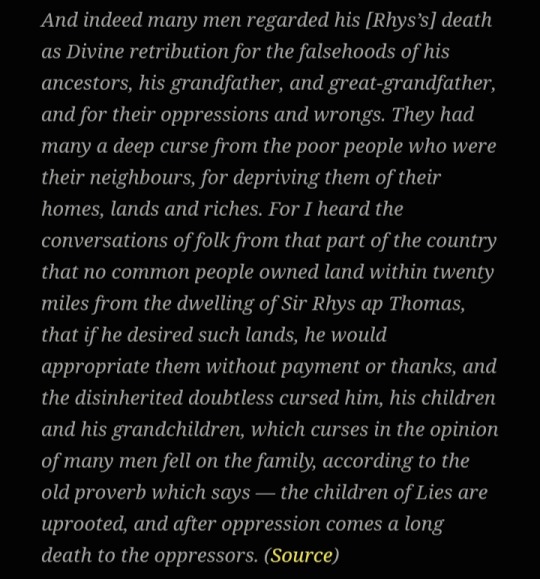
Rhys was beheaded in 1531, but Catherine was in the soup herself after all she'd been up to assisting him.
As Gareth Russell says:
'While we may never know exactly how much his own actions brought about Rhys's death, we can be certain of the devastating effect it had on his widow. She had been intimately involved in her husband's quarrel, and so the possibility that she would be accused of complicity in his alleged treason was tangible.
Left to forge prospects for their three young children — Anne, Thomas and Gruffydd — and fearful for herself, Lady Katherine followed in the footsteps of her elder brother Edmund and flung herself on the mercy of their niece, Anne Boleyn. Once again, the family's dark-eyed golden girl did not disappoint.'
It notable how often you see Anne, and later Elizabeth, willingly pull relatives out of sticky situations, which suggests at least some previous attachment on both sides, as I shouldn't imagine either would be too happy doing it for the more hostile characters.
Compare Katherine's reliance on Anne, a half-niece, to Elizabeth Seymour writing to Cromwell for help, not Jane, her own sister.
'She may even have tried to limit the damage for her aunt and young cousins shortly before Rhys's execution.'
Which was good of Anne considering Rhys had slagged her off, with both of those links having the nerve to imply his death was somehow her doing.
Had he lived, I do wonder if his opposition, compared to Catherine, who, familiarity or not, no doubt wanted to benefit from the connection, would've provoked a certain marital discord.
'Rhys had been attainted at the time of his conviction, meaning that the Crown could seize his goods and property, but his Act of Attainder specifically and unusally made provisions for his widow, who was left with an annual income of about £196.
If Anne could not save Rhys, she worked hard to salvage his family's situation.'
Meaning she got Henry to surrender some of his ill-gotten gains solely to avoid her aunt's destitution, where plenty of other widows and orphans were left to fend for themselves.
Anne also got Catherine a new husband in old-timer Henry Daubeney, but they bloody hated each other and split up soon enough.
According to Eric Ives:
'Over the winter of 1535-6, Katherine Howard, Anne's aunt, was trying to secure a separation from her second husband, Henry, Lord Daubeney. She told Cromwell that the only assistance she was receiving was from the Queen herself, and this despite the strenuous efforts which were being made to destroy her standing with Anne.
The help may have been very practical indeed; Lord Daubeney, who was certainly pleading financial hardship at one stage, reached an amicable agreement with his wife after Anne's father had made available £400.'
Even though this post about Catherine insists neither Anne nor Norfolk gave a toss about her personal woes, from the looks a things Anne was trying to solve this problem too.
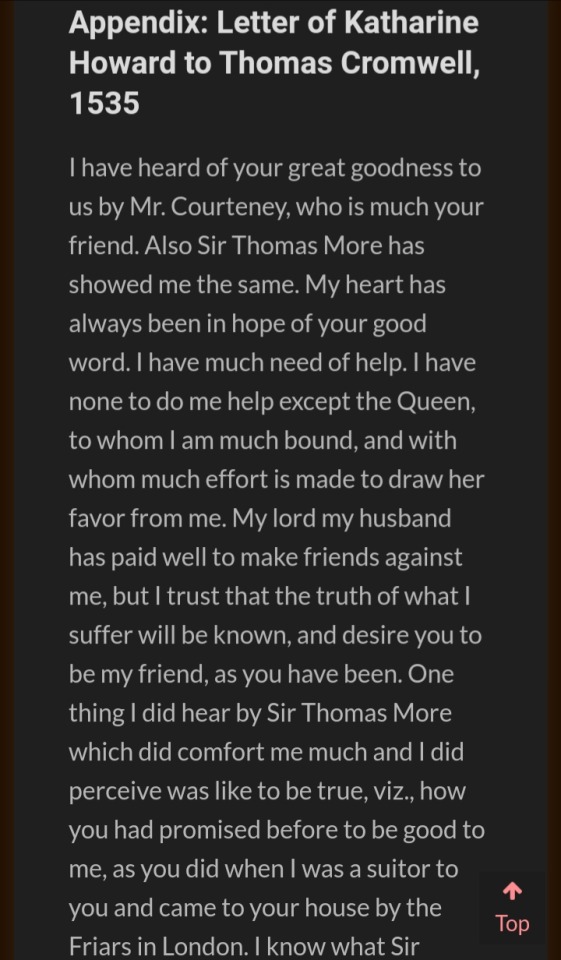
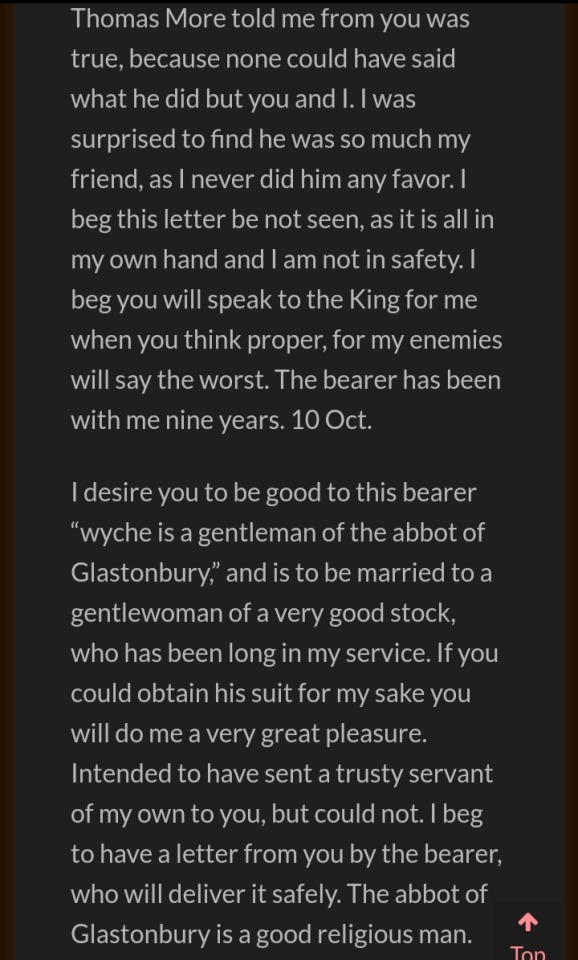
'I have none to do me help except the Queen, to whom I am much bound, and with whom much effort is made to draw her favour from me.
My lord my husband has paid well to make friends against me, but I trust that the truth of what I suffer will be known...'
One wonders how all these paid agitators ended up gathered 'round Anne, nagging or distracting her from Catherine's cause, but evidently she wasn't put off.
Plus, according to that last link, Catherine never learnt her lesson and took part in the Pilgrimage of Grace an' all, raising 3,000 men against Henry!
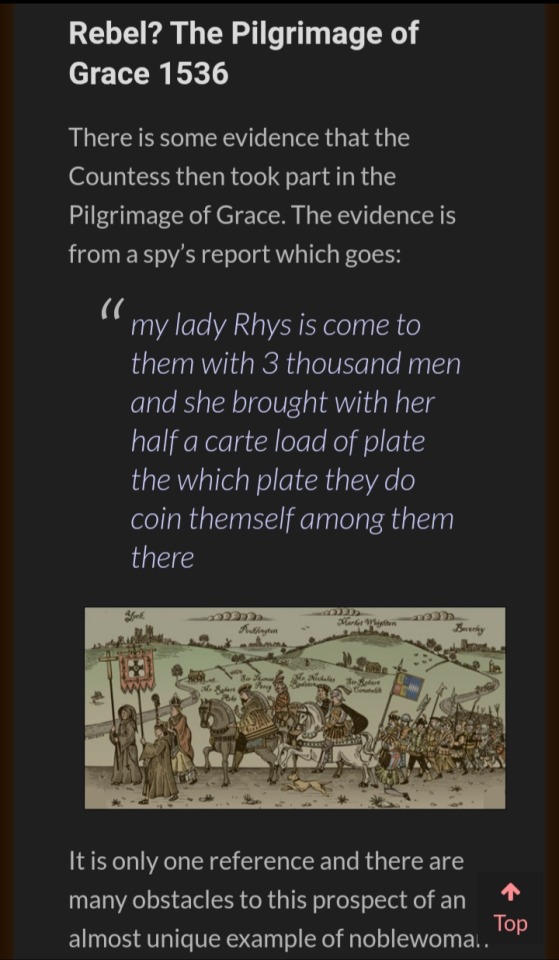
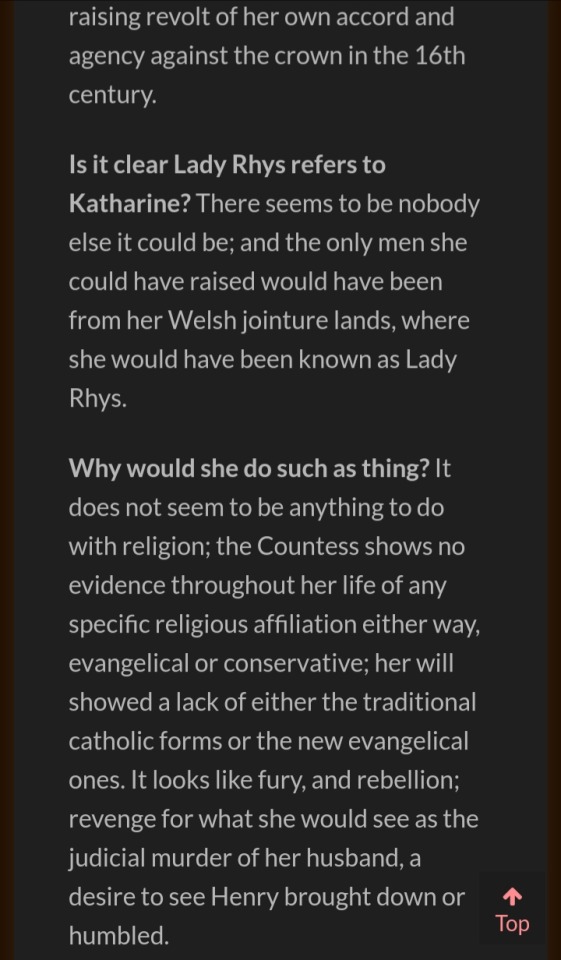
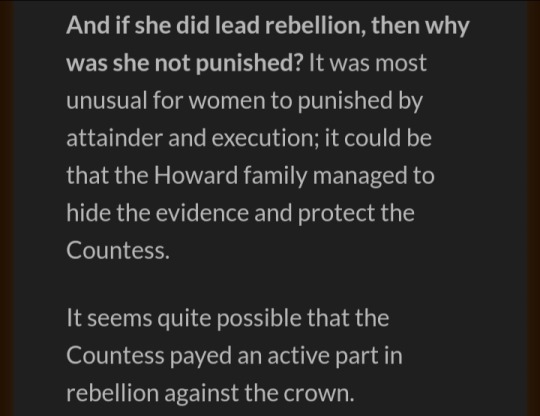
By the sounds of it, this isn't a sudden burst of furious piety at work, rather there's almost an absence of religion in Catherine's life.
The obvious explanation would be yet again wreaking vengeance in Rhys's memory, and that's evident given her long-standing vendetta against his disloyal servants.
But would it be too much to think she was motivated to a certain extent by the death of her niece and nephew, being 'much bound' to the former?
And as she avoided all punishment, the remaining Howards (i.e. Norfolk) had to have covered up for her.
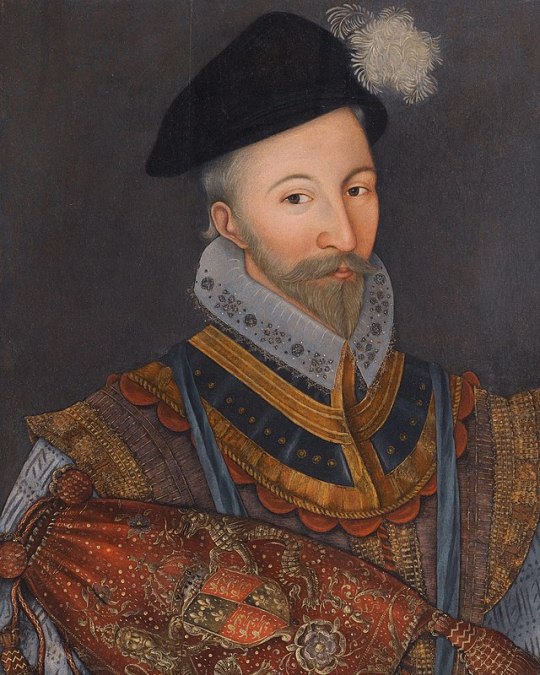
William Howard, 1st Baron Howard of Effingham
In 1529 there was much scrapping over the wardship of the Broughton sisters.
Wolsey ended up with the younger, Katherine, but upon his fall it seems Anne got the girl transferred to the care of Agnes Tilney, who then married her to William, so Anne was responsible for his first marriage.
(Not that it prevented Katherine Broughton from acting, as Ives puts it, as 'ringleader', in a demo for Mary six years later, and getting herself locked up in the Tower as a result, but there you go.)
Given the amount of important roles he enjoyed during Anne's queenship, all whilst barely out of his teens, she must have liked him:
• 1531: Ambassador to Scotland.
• 1532: Travelled to Calais with Anne to meet Francis.
• 1533: Served as Earl Marshal during Anne's coronation, in place of Norfolk.
• 1533: Held the canopy at Elizabeth's christening.
• 1535: Visited Scotland to award the Order of the Garter to James.
• 1536: Went again to Scotland to arrange a meeting between Henry and James.
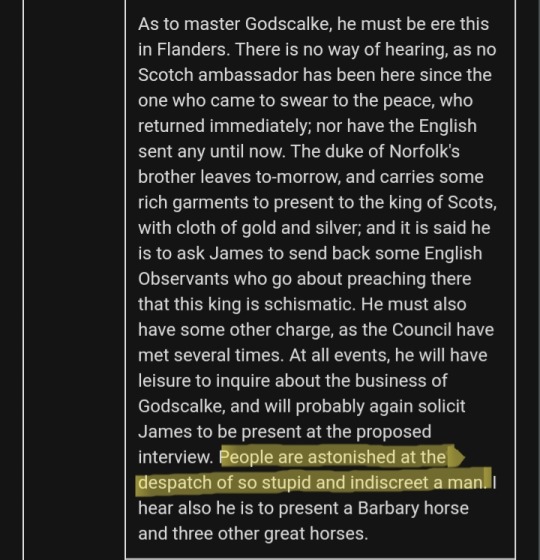
Besides, Chapuys said of him:
'People are astonished at the despatch of so stupid and indiscreet a man.'
So he had to be Anne's friend.
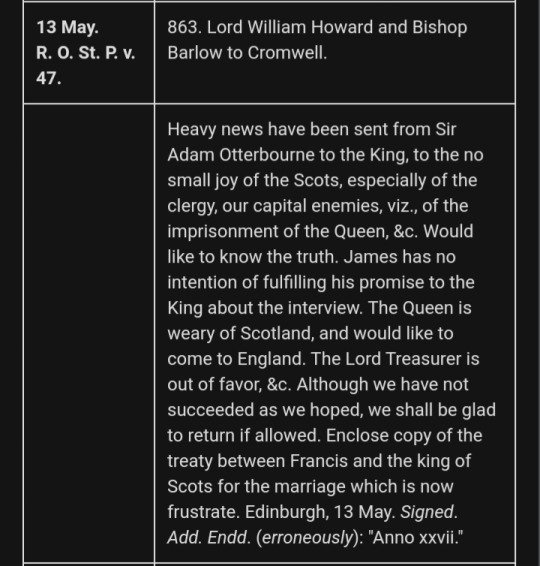
Once he hears of her arrest, William curses it as 'heavy news', demanding to know the truth from Cromwell and resenting all the Scottish clergy as 'capital enemies' for rejoicing in her fall.
Mainly I'm mentioning him to discuss his own character, and where his evident loyalty to other family might give us a further suggestion of his relationship to Anne, and how he kept to that sense of honour even when it led him into dangerous territory.
Consider, for example, how he named his son Charles after his brother, and called his daughter Douglas in honour Margaret Douglas, Charles's wife, thus commemorating their doomed romance.
You'd also be surprised how often he turns up in Young and Damned and Fair, as he appears to have been Katherine's closest uncle, for all that she's usually connected to Norfolk.
Indeed, so deep was he in it Agnes had to be advised not to warn him off coming home, meaning he arrived from France and found himself immediately clapped in the Tower, whereupon he craftily claimed all his best plate was washed overboard so Henry couldn't get at it, which worked.
Later, his connection with Henry Howard ensured he missed out on being Admiral, and when he did get it, Mary took it off him to punish his partiality to Elizabeth.
There's a section here detailing his bond with Elizabeth, where he's credited with saving her life, if you ignore the obvious errors:
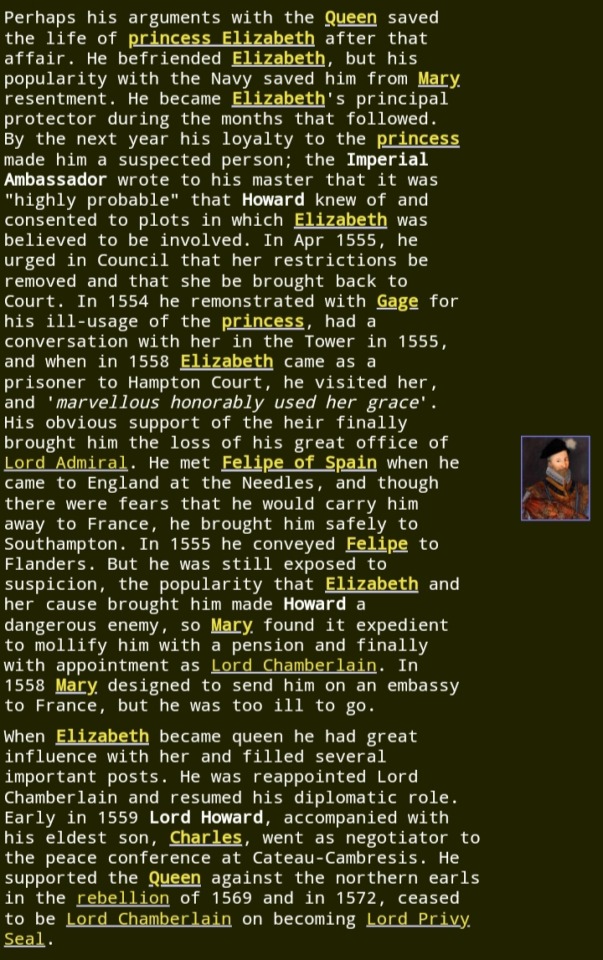
I especially like the idea everyone feared William would kidnap Philip!
However, there's a very odd paragraph in his son's Wiki page:
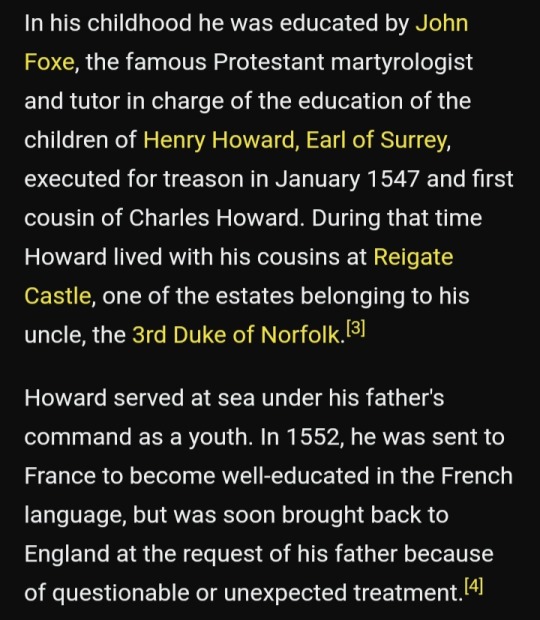
'In 1552, he was sent to France to become well-educated in the French language, but was soon brought back to England at the request of his father because of questionable or unexpected treatment.'
Am I mad or does this imply Charles Howard endured sexual abuse in his teens?
Were it only poor lodgings or sub-standard teaching, he could've moved elsewhere.
Were it excessive beating, you'd expect it to be made plain, not using all this cagey, obfuscating language.
But the thought did lead me to ponder their father-son bond, where Charles, whatever shame he suffered, knew he was loved enough that writing to his father would make it stop.
And William, reading it, rescued him immediately, proving the boy right.
This is a mere fancy of mine, but when it's just after Elizabeth's ordeal, whom he obviously cared so much about, and knowing she could easily have died like Katherine, which happened in part because he never stopped Dereham, one wonders if his moral failing then pushed him to protect Charles and Elizabeth later.
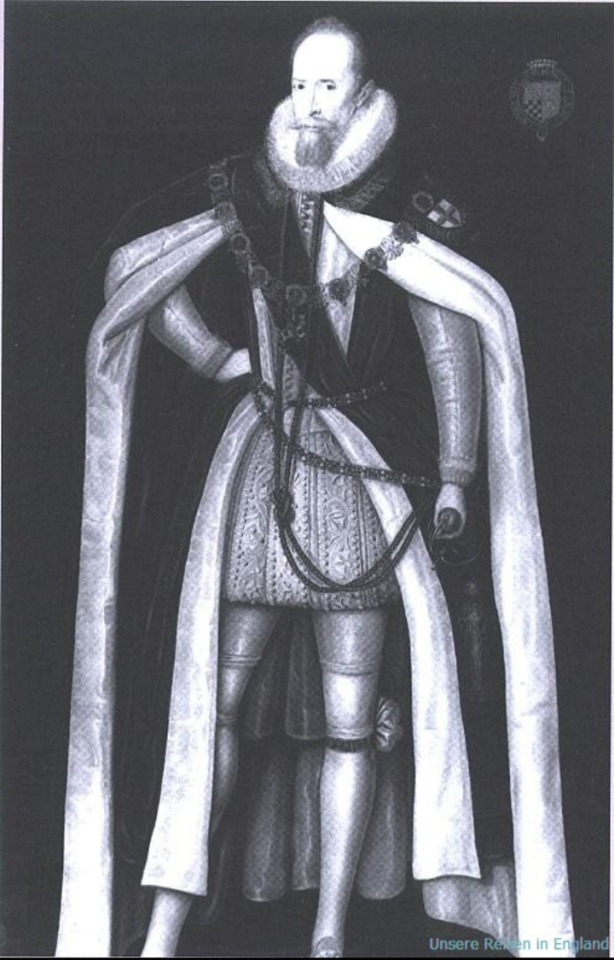
Thomas Howard, 1st Viscount Howard of Bindon
I'm hard-pressed to unearth much information on this lad, but everyone leaves him out so I won't.
There's gotta be some reason Elizabeth ennobled him, and so early on (in 1559) before he'd had the chance to serve her.
It can't just be she looked round the court, noticed he was the last of Norfolk's children, and awarded him for that.
I wish we knew more about Elizabeth's childhood, as in who she met and associated with at court, because you can be certain she met the Howards then.
I also want to add a little about his eldest son, the 2nd Viscount, who was...odd, to say the least:
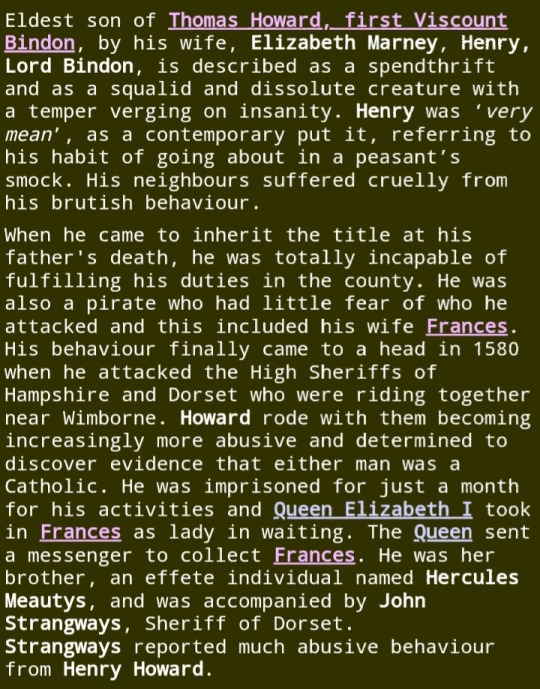
• Being a pirate;
• Dressing as a tramp;
• Beating everyone including his wife.
This gave me the the idea that perhaps his and Norfolk's reputation had somehow been rolled up together over the centuries, where this Henry Howard, although unknown today, was probably infamous in his time, and maybe his behaviour in a sense lended credibility to the accusations of spousal abuse against Norfolk, where people felt Henry 'got it from somewhere'.
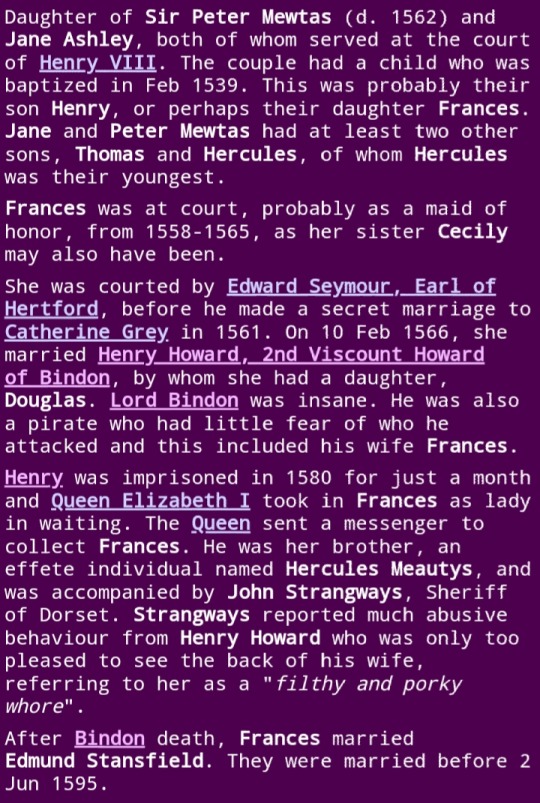
When Elizabeth learnt what he was up to, she sent Hercules Meautys (what a name) to rescue his sister, and took Frances in, with her husband dubbing her 'a filthy and porky whore', which was rich coming from him.
And his other son, the 3rd Viscount, killed his own father-in-law and had a long-running feud with Walter Raleigh.
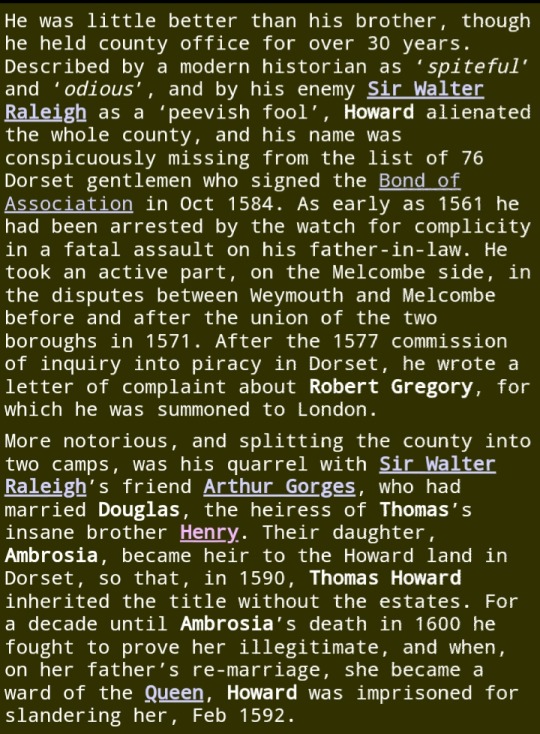
He also spent years trying to have his brother's granddaughter Ambrosia declared a bastard to grab all her land, so Elizabeth locked him up!
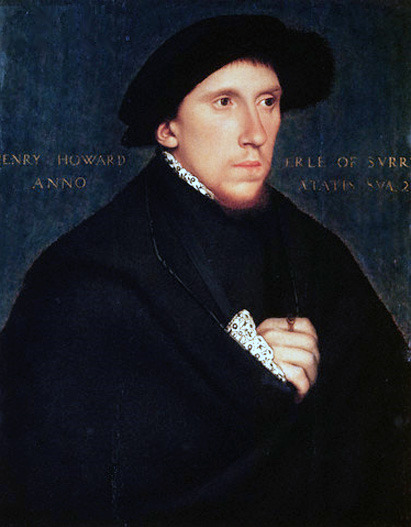
Henry Howard, Earl of Surrey
Anne found Surrey a wife and took him with her to France, where he and FitzRoy remained as honoured guests until the next autumn.
He was then obliged to serve as Earl Marshal as Anne and George were sentenced to death.
Four years later, according to Gareth Russell, Surrey not only watched Cromwell's execution, but gloated about it afterwards:
'Henry Howard, Earl of Surrey, stood at the forefront of the crowd and watched the scene without pity. He was missing his cousin's wedding to be here to see his family's bête noire finished off.
Later that day, he could not conceal his good mood. It felt to him like a settling of scores:
"Now is the false churl dead, so ambitious of others' blood."'
What does this mean?
Who's blood has Cromwell lusted after?
Who did he kill four years ago?
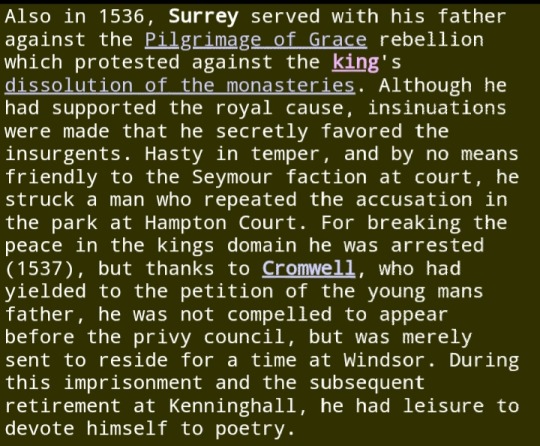
Surrey can't be referring to himself when Cromwell had actually protected him from punishment not long before, which in itself suggests a few interesting things:
• Cromwell was not yet aware of just how much the Howards despised him, as in, up til then his relationship with them was at least civil, cordial even, so the old line about Norfolk begrudging the 'new men' just because they're new men doesn't quite wash.
• This would've the perfect opportunity to bring down a mighty rival, but instead Cromwell felt bizarrely generous and intervened on Surrey's behalf, meaning he saw no harm in preserving the family, and instead thought it useful to get them on side.
• Why does he feel the need to favour the family?
Has he done something to antagonise them?
• The Howards are collectively putting on an Oscar-worthy acting routine of feigned friendliness, or at least indifference to said actions, so Cromwell, whilst he might suspect he's given slight offence, assumes it'll soon be forgotten if he pats them on the head here and there.
• Except whatever Cromwell did, saving Surrey wasn't enough to warrant forgiveness.
And let's examine this quote in detail:
Surrey is at 'the forefront' of spectators, keen to behold Cromwell dying in all its gory brutality, besides opting to watch such a horrendous deed over attending Katherine's wedding.
Instead of a happy celebration of his family's success, something he could've easily enjoyed in the knowledge of Cromwell being dealt with out of the way, he insisted on serving as a witness, as if it wouldn't be over until he'd seen it done, almost to be sure that it had.
For this would 'settle the score', shedding his blood in payback for... what exactly?
Thetford Priory?
Is that all?
Or for the blood Cromwell himself so coveted?
And even the sight of such suffering left Surrey unmoved, ridiculing the dead man not only as a 'churl', but a 'false' one.
False to whom?
'False' as in affecting loyalty to his Queen whilst working to bring her down?
Because is that extreme level of hatred really just supposed to be nothing deeper than empty class prejudice?
Usually, Cromwell's fractious history with the Howards is portrayed as Norfolk's one-man defamation campaign of all-encompassing lordly outrage verging on eye-popping insanity, except Surrey clearly loathed him too.
Perhaps from that we can conclude that Cromwell had become unpopular with the whole family, hence the 'bete noir' reference above.
When Surrey's resentment is remembered, it's conveniently boxed up and filed away as the same-old 'snobbery' of his father, which a very neat, uncomplicated excuse that prevents us looking into it properly.
I daresay Surrey was proud and class-conscious, but wouldn't everyone be like that, to a greater or lesser extent?
Why then is this 'haughtiness' only ever attributed to characters we're supposed to dislike, namely Anne, Norfolk, and occasionally George and Surrey, with the 'good' people somehow immune to such 'base' emotions?
Indeed, I'm starting to wonder how much real evidence there is for this common supposition of arrogance.
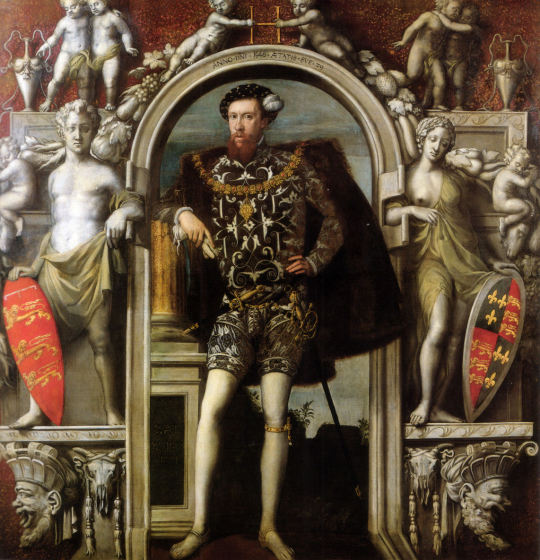
As if Surrey's known at all, it's for the manner of his death, namely he 'got himself killed' by 'stupidly' quartering the royal arms with his own, which, whilst a gross oversimplification, nevertheless defines him, where history views his character through this lens and reads his entire life backwards, as if there's no explanation for his behaviour other than he was just born to be a cocksure moron.
It plays upon modern bigotry against aristocrats, where they're all stuck-up, slow-witted inbreds fixated with the pecking order and archiac symbolism, keeping the honest worker down to prove they're better than everyone else, which is a laugh because they're all REALLY shallow, superfluous chuckleheads and deserve what they get.
Since the idea Surrey died for something so 'silly' as what badge went where slots so well into the stereotype, then it's cheapened his reputation overall.
Rather than being highly esteemed as a pioneer of English literature and the forerunner of Shakespeare, he's treated as nothing but a hot-headed toff tripped up by his own idiotic pretensions, with an end offered as a 'fitting' denouement, almost a lesson in morality; about where not 'knowing your place' or 'getting ideas above your station' leads... after vilifying Surrey and Norfolk for apparently demanding people know their place and not get ideas above their station.
Something hypocritical there.
There's also a reflexive judgementalism within this fandom and the lower end of publishing (i.e. novels and pop. history) where it's assumed if Anne or any of her family are executed, then even if they're technically innocent, they must've deserved it really, else 'the universe' wouldn't let it happen.
Therefore, known evidence is read with the most bad-faith interpretation, with any declared slip leapt upon and blown out of proportion, solely to prove their own bias correct.
You're right to think that, you are.
Hating them makes you A Good Person.
Again, this ONLY applies to Anne and her supporters, not her enemies.
No, no. They were martyrs to the Cause.
But I wouldn't say Surrey's usage of royal arms spoke to any pathological sense of superiority, certainly not to the extent it should define his memory.
Heraldry and ancestry is the lifeblood of nobility: everyone he knew fought for whatever their birth and court careers entitled them, so why shouldn't he?
Look at his sister protesting again and again and again for her rights as FitzRoy's widow: does this make her a 'snob' because she never gave up fighting?
In fact, dubbing Cromwell a 'churl' doesn't mean too much either.
The average person objects to someone because they're a thief, cheat, liar, etc. but calling them as much is a toothless insult, as they'd require a sense of honour to feel the sting.
And if they had that, they would've have committed the offence it in the first place.
So, you pick on something they probably are sensitive about, such as status or physical appearance, to get your own back.
Calling Henry VIII, for example, a fat bastard, doesn't mean you oppose him for having a weight problem, or that you dislike fat men generally.
It's that you're hitting 'below the belt' to inflict the worst punishment you can.
Oh yeah, it's petty, but the aggrieved often are.
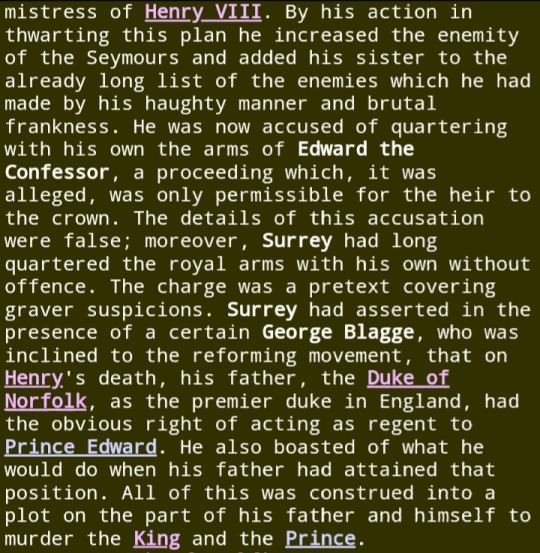
Surrey's real crime, if we deem it one, was apparently rash language of what vengeance he'd wreak on his foes once the King was gone, meaning the Seymours.
So is it mere coincidence that the main targets of this infamous 'snobbery' are those who caused or benefited from Anne's fall?
Are we to believe his only complaint, right down to twice vetoing Mary Howard's marriage, is nothing better than looking down his nose at humble Seymour origins, for they've done nothing whatsoever to draw his ire?
For all the time I've been reading history, the way the court of 1536 splits between the Boleyns and those pushing Jane Seymour, and then, once the Boleyns are wiped out, it greatest rivalry becomes Howard versus Seymour, one lasting for the remainder of Henry's reign, has always struck me as both telling and appropriate.
The idea the Howards took over hating the Seymours because of their slain family is to me to most obvious explanation; the driving force pushing the enmity beyond a decade, and blaming it all on snooty la-di-da attitudes baffles me.
It's so pat and offhand, as if it was thrown into historical research centuries ago and never questioned, passed down to us as unassailable received wisdom, rendered true from repetition, as no one likes Surrey or Norfolk enough to bother reassessing their motivations.
But could such prolonged open hostility run on no greater impulse than keeping the gentry in check?
Is THAT all?
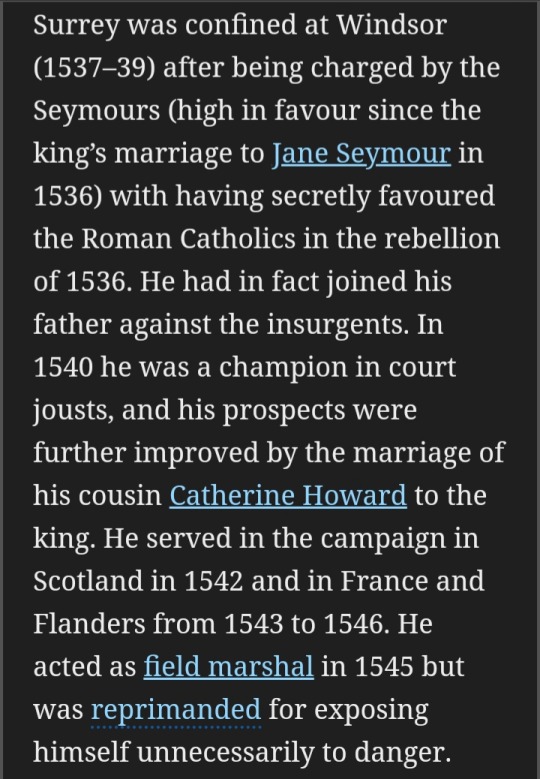
And do note how leading this narrative is, where, if we accept the Howards despised the Seymours as upstarts, then the fault for all bad blood is immediately shoved onto them and them alone, when those poor Seymour lads, rosy-cheeked and pure of heart, are just doing their best in life, working hard and loving everyone.
But oh! Those nasty Howards bullies are So Mean!
Not once is it reversed, proposing that the Seymours envied the Howards' breeding and birth, vowing to bring them down out of spite.
Instead they're absolved of all guilt in the conflict and justified in everything they do as a self-defence measure, even when they brought about Surrey's death and tried it on ten years previously.
So why on earth should he like them?
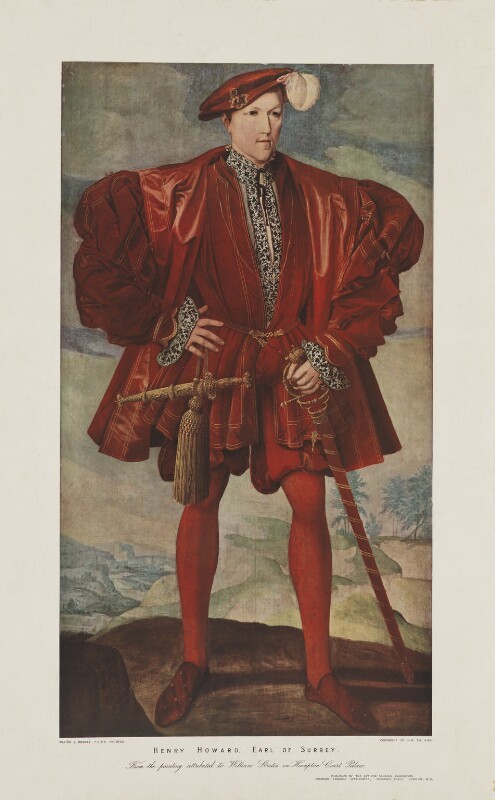
How I wish this painting still existed.
Starkey describes Henry Howard thus:
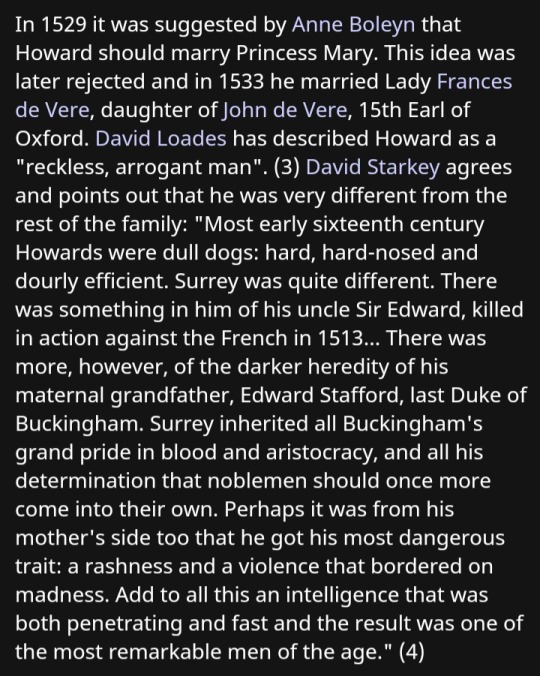
'Surrey inherited all Buckingham's grand pride in blood and aristocracy, and all his determination that noblemen should once more come into their own.
Perhaps it was from his mother's side too that he got his most dangerous trait: a rashness and a violence that bordered on madness.
Add to all this an intelligence that was both penetrating and fast and the result was one of the most remarkable men of the age.'
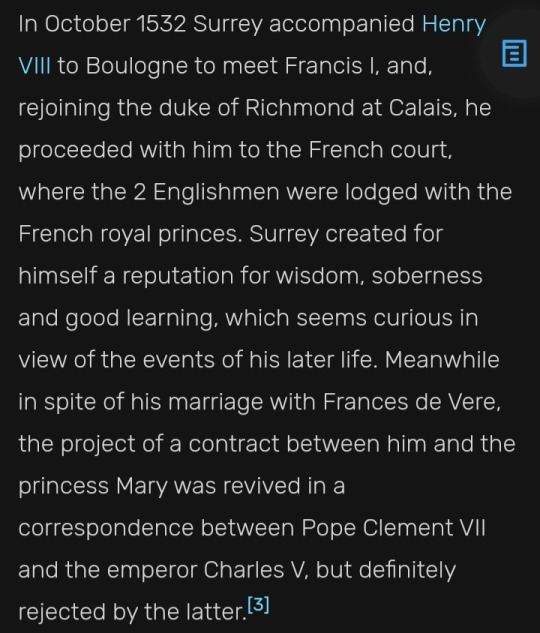
And yet I don't know of any aggressive outbursts prior to 1536, being then known for 'soberness and good learning'.
We tend to class poets of later eras as on the sensitive side, so far from being 'always like that', it may well be that the deaths of George, Anne, FitzRoy and putting down the Pilgrimage of Grace knocked him off the rails, a process then driven beyond all remedy by watching Katherine die and the suicidal shame he endured over his military failures.

Although I do like the sound of him as the hero of High Fantasy.
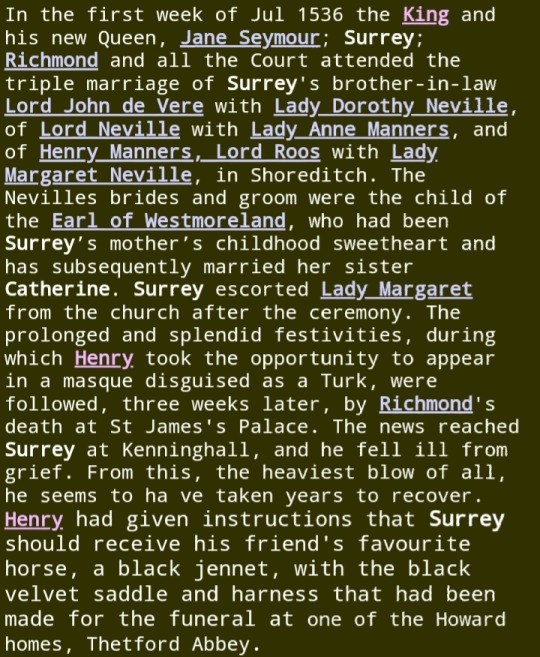
Whilst I'm here, let's look at this very awkward scenario of Surrey attending the triple Neville wedding, being the children of his mother's intended and her sister.
Considering how desperate so many are to clear Henry VIII of Anne's death, protesting how he Genuinely Believed and that makes it alright then, he's cheerful enough fannying about as a Turk less than two months later.
Finally, writing this I read several of Surrey's poems, and must include this truly endearing piece commemorating his wife's love for him:
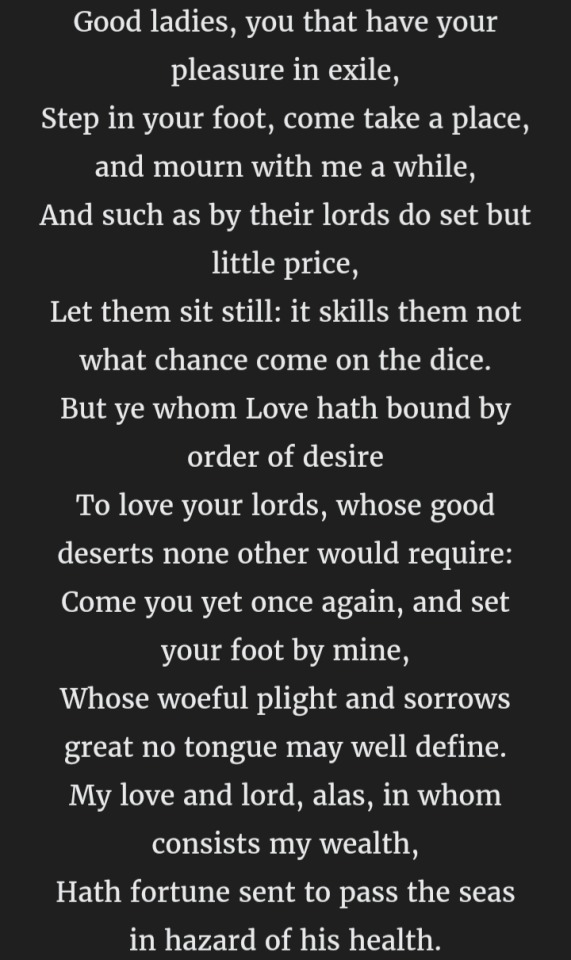
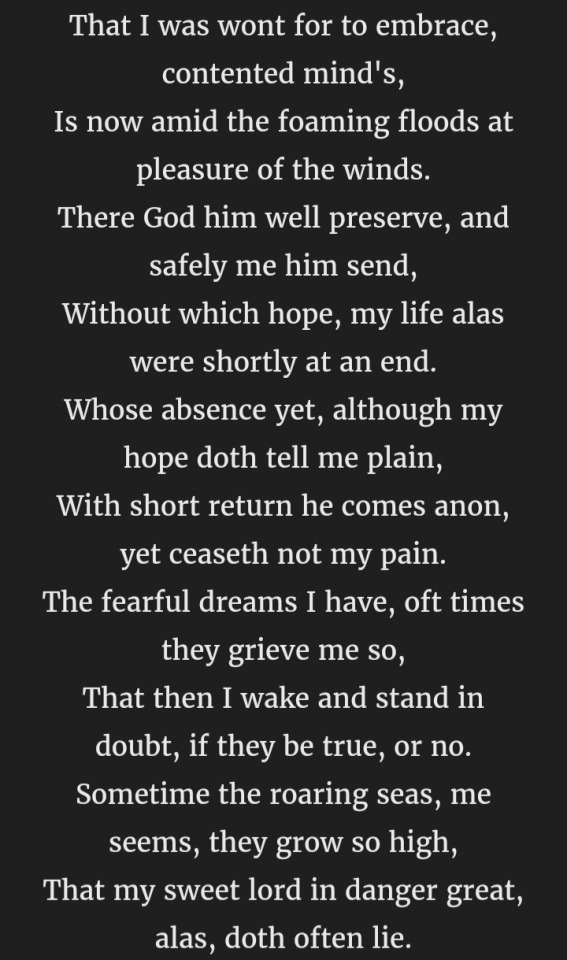
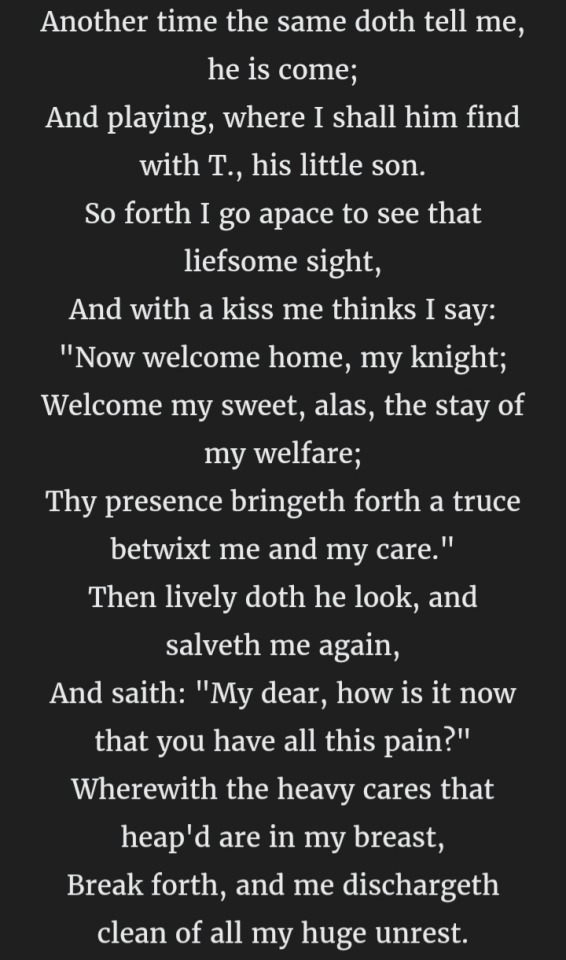
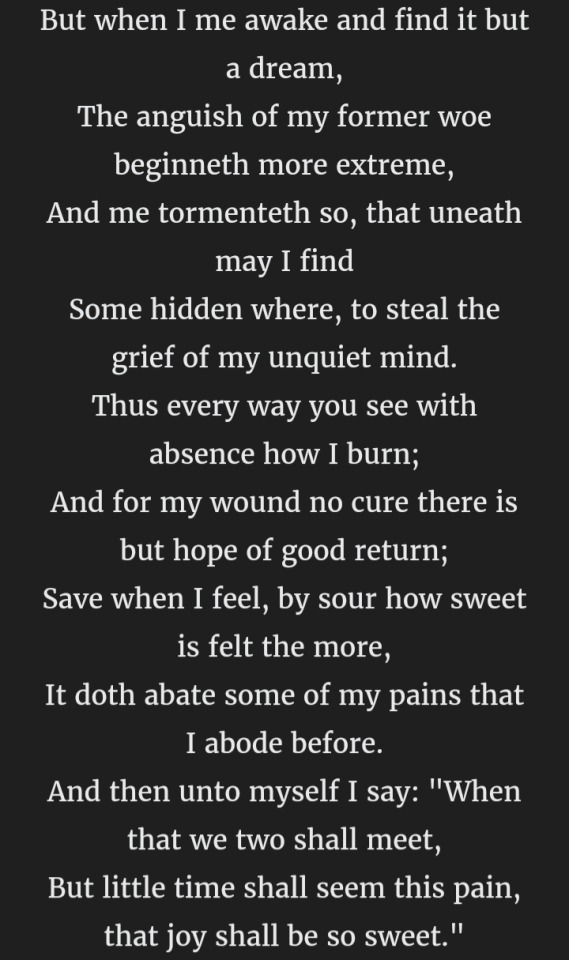
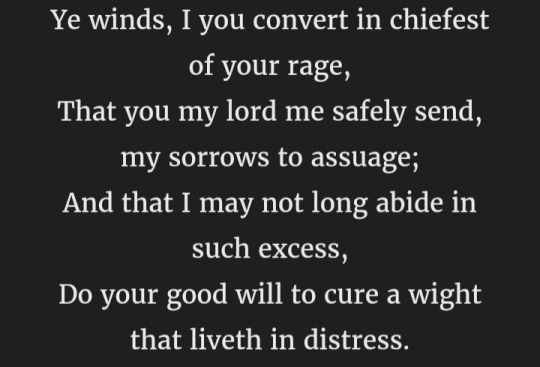
Such a poet, and still no one credits him with any tender emotions.
Anyway, don't mind me but I've hit the picture limit.
I'm not sure when Part Two will be done, but I'll let you know, come the time.
#Thomas Howard 3rd Duke of Norfolk#Henry VIII#Thomas Darcy 1st Baron Darcy de Darcy#Thomas Cromwell#Eustace Chapuys#Henry FitzRoy#Thomas Howard#Margaret Douglas#John Hussey 1st Baron Hussey of Sleaford#George Talbot 4th Earl of Shrewsbury#Mary I#Mary Howard#Anne Boleyn#John de Vere 15th Earl of Oxford#Robert Radclyffe 1st Earl of Sussex#Anne Howard#John de Vere 14th Earl of Oxford
7 notes
·
View notes
Text
Welcome to Letters2fiction!
The concept here is to send in a question or a letter request, and you’ll get a response from your fictional character of choice, from the list below. Please stick to the list I’ve made, but of course, you can ask if there’s some other characters I write for, I don’t always remember all the shows, movies or books I’ve consumed over the years and I’m sure I’m missing a lot 😅
Status: New Characters added - Thursday March 21st, 2024

TV SERIES
A Discovery of Witches:
Matthew Clairmont
Baldwin Montclair
Gallowglass de Clermont
Marcus Whitmore
Philippe de Clermont
Jack Blackfriars
Sarah Bishop
Emily Mather
Diana Bishop
Ysabeau de Clermont
Miriam Shepard
Phoebe Taylor
Gerbert D’Aurillac
Peter Knox
Father Andrew Hubbard
Benjamin Fuchs
Satu Järvinen
Meridiana
Law and Order:
Rafael Barba
Sonny Carisi
Joe Velasco
Mike Duarte
Terry Bruno
Peter Stone
Hasim Khaldun
Nick Amaro NEW!
Mike Dodds
Grace Muncy
Kat Tamin
Toni Churlish
Amanda Rollins
Olivia Benson
Rita Calhoun
Casey Novak
Melinda Warner
George Huang
Sam Maroun
Nolan Price
Jamie Whelan
Bobby Reyes
Jet Slootmaekers
Ayanna Bell
Jack McCoy
Elliot Stabler
One Chicago:
Jay Halstead (Could also be Will if you want)
Antonio Dawson
Adam Ruzek
Greg "Mouse" Gerwitz
Dante Torres
Vanessa Rojas
Kevin Atwater
Sean Roman
Matt Casey
Kelly Severide
Joe Cruz
Sylvie Brett
Blake Gallo
Christopher Hermann
"Mouch"
Otis
Violet Mikami
Evan Hawkins
Mayans MC:
Angel Reyes
Miguel
Bishop
Coco
Nestor
911 verse:
Athena Grant
Bobby Nash
Henrietta "Hen" Wilson
Evan "Buck" Buckley
Eddie Diaz
Howie "Chimney" Han
Ravi Panikkar
T.K. Strand
Owen Strand
Carlos Reyes
Marjan Marwani
Paul Strickland
Tommy Vega
Judson "Judd" Ryder
Grace Ryder
Nancy Gillian
Mateo Chavez
The Rookie:
Lucy Chen
Tim Bradford
Celina Juarez
Aaron Thorsen
Nyla Harper
Angela Lopez
Wesley Evers
BBC Sherlock:
Greg Lestrade
Mycroft Holmes
Sherlock Holmes
Moriarty
Molly
Bridgerton:
Anthony Bridgerton
Benedict Bridgerton
Simon Basset
Daphne Bridgerton
Eloise Bridgerton
Kate Sharma
Edwina Sharma
Marina Thompson/Crane
Outlander:
Jamie Fraser
Claire Beauchamp Randall Fraser
Frank Randall
Black Jack Randall
Brianna Fraser
Roger MacKenzie
Fergus Fraser
Marsali Fraser
Jenny Fraser Murray
Ian Murray Sr.
Ian Fraser Murray
Murtagh Mackenzie
Call The Midwife:
Shelagh Turner / Sister Bernadette
Dr. Patrick Turner
Nurse Trixie Franklin
Nurse Phyllis Crane
Lucille Anderson
Nurse Barbara Gilbert
Chummy
Sister Hilda
Miss Higgins
PC Peter Noakes
Reverend Tom Hereward NEW!
Narcos:
Horacio Carrillo
Peaky Blinders:
Tommy Shelby
Downton Abbey:
Robert Crawley, Earl of Grantham
Cora Crawley, Countess of Grantham
Lady Mary Crawley
Lady Edith Crawley
Lady Sybil Crawley
Violet Crawley, Dowager Countess of Grantham
Isobel Crawley
Matthew Crawley
Lady Rose MacClare
Lady Rosamund Painswick
Henry Talbot
Tom Branson
Mr. Charles Carson
Mrs. Hughes / Elsie May Carson
John Bates
Anna Bates
Daisy Mason
Thomas Barrow
Joseph Molesley
Land Girl:
Connie Carter
Reverend Henry Jameson (Gwilym Lee's version)
Midsomer Murder:
DCI Tom Barnaby
Joyce Barnaby
Dr. George Bullard
DCI John Barnaby
Sarah Barnaby
DS Ben Jones
DS Jamie Winter
Sgt. Gavin Troy
Fleur Perkins
WPC Gail Stephens
Kate Wilding
DS Charlie Nelson
Sergeant Dan Scott
NEW! Once Upon A Time
Regina / The Evil Queen
Mary Margaret Blanchard / Snow White
David Nolan / Prince Charming
Emma Swan
Killian Jones / Captain Hook
Mr. Gold / Rumplestiltskin
Neal Cassidy / Baelfire
Peter Pan
Sheriff Graham Humbert / The Huntsman
Jefferson / The Mad Hatter
Belle
Robin of Locksley / Robin Hood
Will Scarlet
Zelena / Wicked Witch
Alice (Once in Wonderland)
Cyrus (Once in Wonderland)
Jafar (Once in Wonderland)
Gideon
Tiger Lily
Naveen
Tiana
Granny
Ariel
Prince Eric
Aladdin
Jasmine
Dr. Jekyll and Mr. Hyde
Hercules
Megara
Tinker Bell
Merida
Red Riding Hood
Mulan
Aurora / Sleeping Beauty
Prince Phillip
Cinderella
Prince Thomas
NEW! The Vampire Diaries / The Originals
Stefan Salvatore
Damon Salvatore
Caroline Forbes
Elena Gilbert
Bonnie Bennett
Enzo St. John
Niklaus Mikaelson
Elijah Mikaelson
Kol Mikaelson
Rebekah Mikaelson
Freya Mikaelson
Finn Mikaelson
Mikael
Esther
Marcel Gerard
Davina Claire
MOVIES
The Pirates of the Caribbean:
Captain Jack Sparrow
Barbossa
Will Turner
Elizabeth Swann
James Norrington
Kingsman:
Merlin
Harry Hart
Eggsy Unwin
James Spencer / Lancelot
Alastair / Percival
Roxy Morton / Lancelot
Maximillian Morton / The Shepherd
Orlando Oxford
Jack Daniels / Whiskey
Gin
BOOKS
Dreamland Billionaire series - Lauren Asher:
Declan
Callahan
Rowan
Iris
Alana
Zahra
Dirty Air series - Lauren Asher:
Noah
Liam
Jax
Santiago
Maya
Sophie
Elena
Chloe
Ladies in Stem - Ali Hazelwood books:
Olive
Adam
Bee
Levi
Elsie
Jack
Mara
Liam
Sadie
Erik
Hannah
Ian
Fourth Wing - Rebecca Yarros:
Xaden Riorson
Dain Aetos
Jack Barlowe
Rhiannan Matthias
Violet Sorrengail
Mira Sorrengail
Lillith Sorrengail
Bodhi Durran
Liam Mairi
#a discovery of witches#law and order svu#law and order#law and order oc#chicago pd#chicago fire#mayans mc#911 abc#911 lone star#the rookie#bbc sherlock#sherlock#bridgerton#outlander#call the midwife#narcos#downton abbey#peaky blinders#land girls#midsomer murders#once upon a time#the vampire diaries#the originals#the pirates of the caribbean#kingsman#dreamland billionaires#dirty air series#love hypothesis#love theoretically#loathe to love you
40 notes
·
View notes
Note
What were the symbols of Margaret of Anjou, Elizabeth Wydeville and Elizabeth of York? Do we know why they chose them?
Hi!
Margaret of Anjou used the marguerite daisy, which was white tipped in red. We see it in the Talbot-Shrewsbury book and the ‘Book of the Skinners Company’ in 1475. This flower seems to have been a common symbol/emblem for women named Margaret in England: iirc, Margaret Holland Duchess of Clarence and her granddaughter Margaret Beaufort were also represented by it at times.
Elizabeth Woodville used a deep red gillyflower or clove pink. These were strongly associated with Virgin Mary's iconography; this specific shade symbolized virtuous love, betrothal and marriage; and it was also known as the ‘queen of delights’, giving it distinctly royal associations. Compared to both predecessor and her daughter, Elizabeth’s had no ‘default’ symbol to use, so she evidently got creative.
Elizabeth of York used the white rose of York, one of her father’s most important symbols. This was not just a personal emblem but distinctly dynastic: it emphasized Elizabeth's identity as the Yorkist heiress and contributed to Tudor image politics, in turn symbolized by their now-iconic red-and-white rose.
Hope this helps! If anyone wants to add anything, feel free <3
67 notes
·
View notes
Text
MY GUYS 🚨‼️
I promised I wouldn’t post *too* much about my book here, especially since it’s a very different vibe to Tell No Tales, but if you’ll allow me this I promise I’ll shut up about it for a bit
Anyone based near Liverpool or London, we’ve just announced two events for the launch of LOVER BIRDS 💖

On launch day (4th July - remember to vote first) we’re celebrating in Liverpool One Waterstones. I’ll be joined by Margaret McDonald (Glasgow Boys) on a panel chaired by PJ Ellis (Love & Other Scams, We Could Be Heroes) to chat about queer books, working class identities, and the cities that shaped us 💖 Buy tickets here (or by following the link in the image)

The next day (5th July) I’ll be joining a mind-blowing panel at the Common Press in Shoreditch. This line-up includes Elle McNicoll (A Kind of Spark, Some Like it Cold), Theo Parish (Homebody), and Faridah Àbíké-Íyímídé (Ace of Spades, Where Sleeping Girls Lie), chaired by Rosie Talbot (Sixteen Souls). We’ll be chatting about queer and neurodiverse characters & identities 💖 Buy tickets here (or by following the link in the image)

I am SO EXCITED about these line-ups, it’s a huge honour as a debut author to share the stage with these talented authors I admire so much. If you can, please do come along because both events are going to be enormously fun!
(And if it sways you either way, I’ll be bringing along Tell No Tales stickers to give away. Because really, when *can* you promote your audio drama if not at your own book signing?)
23 notes
·
View notes
Text
avarice (6675 words) by hallowlock Chapters: 1/1 Fandom: Borderlands (Video Games) Rating: Mature Warnings: Graphic Depictions Of Violence, Major Character Death Relationships: Wharton Jakobs/Original Character, Singleton Talbot Jakobs/Original Character, Margaret Jakobs/Montgomery Jakobs, Sir Hammerlock/Wainwright Jakobs, Wainwright Jakobs & Original Character, Oletta & Wainwright Jakobs Characters: Wainwright Jakobs, Wharton Jakobs, Original Characters, Oletta (Borderlands), Singleton Talbot Jakobs, Maddox Jakobs, Alistair Hammerlock (mentioned), Angel (Borderlands) (mentioned), Margaret Jakobs, Montgomery Jakobs, The Stranger | H.W.J.L. (Jakobs Family Values) (mentioned) Additional Tags: Confusing, Ergodic Fiction, Gothic Horror, Southern Gothic, Biblical Themes (Abrahamic Religions), Mythology References, Literary References & Allusions, Inspired by House of Leaves - Mark Z. Danielewski, Magical Realism, LGBTQ Themes, Symbolism, POV Alternating, Swingers, Canon-Typical Violence, Implied/Referenced Drug Use, Canonical Character Death, Trans Wainwright Jakobs, Trans Sir Hammerlock, T4T Sir Hammerlock/Wainwright Jakobs, Derogatory Language, Angel Lives (Borderlands), Newborn Children, Non-Explicit Sexual Content, Murder, Blood and Gore, Haunted Houses, Unhealthy Relationships, Autism, Ghosts, Eldritch Wainwright Jakobs (implied), Minor Political/Social Themes, a singular reference to sexually transmitted disease Series: Part 5 of Alivemanor (and Supplementaries) Summary:
The soft wind blew at the then-youthful manor-walls.
REQUIRED READING: This work is a supplementary for and contains spoilers for JakobsEstate.sav, it's HIGHLY recommended you read it before this.
8 notes
·
View notes
Text
OT3 Verse Headcast
So @onekisstotakewithme asked me this question from a meme:
🎬 If a movie or show were based on your fic, which fic would you choose and who would you fancast?
And listen I usually say ‘Jewish Anne Boleyn’ but I don’t actually know of any biracial Persian Jewish actors to cast for that so I thought I’d do my giant emotional support Tudors AU aka The OT3 Verse. See here for summary of. So I thought I’d write out (with pictures) all the headcasts I have.
PLEASE feel free to ask me about any of them and I will answer like I was a show runner giving an interview to a media outlet because DUH.
Under a cut because LONG.
The Triad

Natalie Dormer (Anne Boleyn)

James Frain (Thomas Cromwell)

Jonathan Rhys Meyers (King Henry VIII)
Boleyn Family

Rufus Sewell/Luke Thompson (Thomas Boleyn)

Joanne Whalley/Eleanor Tomlinson (Elizabeth Boleyn)

Jonathan Bailey (George Boleyn)

Morfydd Clark (Jane Boleyn)

Holliday Granger (Mary Boleyn) because @houseofborgia in part because I think she would rock OT3 verse Mary.
Dudley Family

Matthew Goode (John Dudley)

Tom Blythe (Robert Dudley)
(Jane Dudley is obviously here but placeholder for now because stuck on headcast)
Children Of The Triad (adults)
Princess Mary (Sarah Bolger)
Princess Elizabeth (Sophie Turner)
Prince Thomas (Patrick Gibson)
Prince George (Ethan Peck)
Prince William (Ruari O’Connor)
Princess Margaret (Lola Petticrew)
Prince Owen (Ben Barnes)
Prince Edmund (Kerem Busin is the best visual representation I have but honestly like picture Travis Kelce with red hair and Giant)
Princess Philippa (Goldshifteh Farahani)
Other Major Characters
Princess Mihrimah/Mihrimah Sultan (I go between Sujaya Dasgupta for VIBES and because I think she’d kill it and Pelin Karahan)
John Welles, Earl of Norwich (Rupert Graves)
Thomas Howard, Duke Of Norfolk (Jeremy Irons)
Bridget Grey, nee Talbot (Hannah New)
Lionel Grey (Toby Regbo)
Charles Brandon, Duke of Sussex (Henry Cavill)
Mary Brandon, Duchess of Sussex (Debra Messing thank you @the-ships-to-rule-them-all so much for suggestion 🩷)
(I do also have the grandchildrens generation but that’s WAY TOO MUCH)
13 notes
·
View notes
Text
Golden Age of Hollywood Actors Born Before (And Including) 1937 Still Alive
This only includes actors that had at least one credited role in a Hollywood feature film or short up to 1959.
Elisabeth Waldo (b. 1918)
Caren Marsh Doll (b. 1919)
Patricia Wright (b. 1921)
Jacqueline White (b. 1922)
Annette Warren (b. 1922)
Ray Anthony (b. 1922)
Tommy Dix (b. 1923)
Eva Marie Saint (b. 1924)
Anne Vernon (b. 1924)
Maria Riva (b. 1924)
June Lockhart (b. 1925)
Lee Grant (b. 1925)
Peggy Webber (b. 1925)
Lise Bourdin (b. 1925)
Brigitte Auber (b. 1925)
Kerima (b. 1925)
Terry Kilburn (b. 1926)
Marilyn Erskine (b. 1926)
Bambi Linn (b. 1926)
David Frankham (b. 1926)
Tommy Morton (b. 1926)
Jill Jarmyn (b. 1926)
Marilyn Knowlden (b. 1926)
Genevieve Page (b. 1927)
Donna Martell (b. 1927)
William Smithers (b. 1927)
Peter Walker (b. 1927)
H.M. Wynant (b. 1927)
Betty Harford (b. 1927)
Cora Sue Collins (b. 1927)
Marilyn Granas (b. 1927)
Ann Blyth (b. 1928)
Nancy Olson (b. 1928)
Peggy Dow (b. 1928)
Kathleen Hughes (b. 1928)
Colleen Townsend (b. 1928)
Marion Ross (b. 1928)
Gaby Rodgers (b. 1928)
Jan Shepard (b. 1928)
Walter Maslow (b. 1928)
Tom Troupe (b. 1928)
Sidney Kibrick (b. 1928)
Garry Watson (b. 1928)
Fay Chaldecott (b. 1928)
Mark Rydell (b. 1929)
Terry Moore (b. 1929)
Vera Miles (b. 1929)
Ann Robinson (b. 1929)
Liseotte Pulver (b. 1929)
James Hong (b. 1929)
Rachel Ames (b. 1929)
Olga James (b. 1929)
Michael Forest (b. 1929)
Vikki Dougan (b. 1929)
Steve Terrell (b. 1929)
Margaret Kerry (b. 1929)
James Congdon (b. 1929)
Betsy Gay (b. 1929)
Jack Betts (b. 1929)
Clint Eastwood (b. 1930)
Joanne Woodward (b. 1930)
Mara Corday (b. 1930)
Nita Talbot (b. 1930)
Taina Elg (b. 1930)
Robert Wagner (b. 1930)
John Astin (b. 1930)
Tommy Cook (b. 1930)
Mary Costa (b. 1930)
Lois Smith (b. 1930)
Will Hutchins (b. 1930)
Peggy King (b. 1930)
Lynn Hamilton (b. 1930)
Don Burnett (b. 1930)
Clark Burroughs (b. 1930)
Robert Hinkle (b. 1930)
Sheila Connolly (b. 1930)
Barbara Bestar (b. 1930)
Rita Moreno (b. 1931)
Leslie Caron (b. 1931)
Carroll Baker (b. 1931)
William Shatner (b. 1931)
Mamie Van Doren (b. 1931)
Robert Colbert (b. 1931)
Barbara Eden (b. 1931)
Angie Dickinson (b. 1931)
Claire Bloom (b. 1931)
Marianne Koch (b. 1931)
Sylvia Lewis (b. 1931)
Carmen De Lavallade (b. 1931)
Zohra Lampert (b. 1931)
Michael Dante (b. 1931)
Ann McCrea (b. 1931)
Jack Grinnage (b. 1931)
Maralou Gray (b. 1931)
Billy Mindy (b. 1931)
Sugar Dawn (b. 1931)
Joanne Arnold (b. 1931)
Joel Grey (b. 1932)
George Chakiris (b. 1932)
Felicia Farr (b. 1932)
Abbe Lane (b. 1932)
Steve Rowland (b. 1932)
Jacqueline Beer (b. 1932)
Colleen Miller (b. 1932)
Joanne Gilbert (b. 1932)
Olive Moorefield (b. 1932)
Neile Adams (b. 1932)
Jacqueline Duval (b. 1932)
Edna May Wonnacott (b. 1932)
Richard Tyler (b. 1932)
Mickey Roth (b. 1932)
Leon Tyler (b. 1932)
Peggy McIntyre (b. 1932)
Christiane Martel (b. 1932)
Elsa Cardenas (b. 1932)
Claude Bessy (b. 1932)
Kim Novak (b. 1933)
Julie Newmar (b. 1933)
Debra Paget (b. 1933)
Constance Towers (b. 1933)
Joan Collins (b. 1933)
Kathleen Nolan (b. 1933)
Brett Halsey (b. 1933)
Robert Fuller (b. 1933)
Pat Crowley (b. 1933)
Barrie Chase (b. 1933)
Jackie Joseph (b. 1933)
Geoffrey Horne (b. 1933)
Tsai Chin (b. 1933)
Lita Milan (b. 1933)
Vera Day (b. 1933)
Diana Darrin (b. 1933)
Ziva Rodann (b. 1933)
Jeanette Sterke (b. 1933)
Marti Stevens (b. 1933)
Annette Dionne (b. 1933)
Cecile Dionne (b. 1933)
Johnny Russell (b. 1933)
Patti Hale (b. 1933)
Gary Clarke (b. 1933)
Shirley MacLaine (b. 1934)
Sophia Loren (b. 1934)
Shirley Jones (b. 1934)
Russ Tamblyn (b. 1934)
Pat Boone (b. 1934)
Audrey Dalton (b. 1934)
Claude Jarman Jr. (b. 1934)
Tina Louise (b. 1934)
Karen Sharpe (b. 1934)
Joyce Van Patten (b. 1934)
May Britt (b. 1934)
Joby Baker (b. 1934)
Jamie Farr (b. 1934)
Myrna Hansen (b. 1934)
Priscilla Morgan (b. 1934)
Aki Aeong (b. 1934)
Robert Fields (b. 1934)
Dani Crayne (b. 1934)
Donnie Dunagan (b. 1934)
Richard Hall (b. 1934)
Charles Bates (b. 1934)
Marilyn Horne (b. 1934)
Marilee Earle (b. 1934)
Rod Dana (b. 1935)
Pippa Scott (b. 1935)
Ruta Lee (b. 1935)
Barbara Bostock (b. 1935)
Johnny Mathis (b. 1935)
Leslie Parrish (b. 1935)
Salome Jens (b. 1935)
Yvonne Lime (b. 1935)
Jean Moorehead (b. 1935)
Marco Lopez (b. 1935)
Joyce Meadows (b. 1935)
Richard Harrison (b. 1935)
Christopher Severn (b. 1935)
Richard Nichols (b. 1935)
Carol Coombs (b. 1935)
Nino Tempo (b. 1935)
Patricia Prest (b. 1935)
Dawn Bender (b. 1935)
John Considine (b. 1935)
Jerry Farber (b. 1935)
Clyde Willson (b. 1935)
Bob Burns (b. 1935)
Joel Newfield (b. 1935)
Marlene Cameron (b. 1935)
Susan Kohner (b. 1936)
Millie Perkins (b. 1936)
Burt Brickenhoff (b. 1936)
Mason Alan Dinehart (b. 1936)
Anna Maria Alberghetti (b. 1936)
Lisa Davis (b. 1936)
Joan O'Brien (b. 1936)
Richard Harrison (b. 1936)
Tommy Ivo (b. 1936)
John Wilder (b. 1936)
Gary Conway (b. 1936)
Michael Chapin (b. 1936)
Carol Morris (b. 1936)
Fernando Alvarado (b. 1936)
Jack Nicholson (b. 1937)
Tommy Sands (b. 1937)
William Wellman Jr. (b. 1937)
Paul Hampton (b. 1937)
George Takei (b. 1937)
Margaret O’Brien (b. 1937)
Connie Francis (b. 1937)
Carol Nugent (b. 1937)
Patti Brady (b. 1937)
June Hedin (b. 1937)
Paul Collins (b. 1937)
Maureen Hingert (b. 1937)
#dannyreviews#eva marie saint#june lockhart#lee grant#marion ross#terry moore#vera miles#clint eastwood#joanne woodward#robert wagner#mamie van doren#barbara eden#angie dickinson#claire bloom#rita moreno#joel grey#leslie caron#william shatner#george chakiris#kim novak#julie newmar#shirley maclaine#sophia loren#joan collins#russ tamblyn#pat boone#jamie farr#ruta lee#shirley jones#joyce van patten
10 notes
·
View notes
Text

Charles “Cartoon Charlie” Thorson (1890-1966) “Sniffles” Warner Bros Mouse character 8 pencil sketch model sheet.
Anyone seen Sniffles? I haven’t and I’m trying imagine Mel’s voice for him. He evolved into a koala.

Charles Thorson Cartoon Koala Illustration (c. 1940s) Source
Follow-up on Sniffles and wiki answers all. “In Naughty but Mice (1939), Sniffles has a cold and is searching for a remedy. He eventually stumbles upon an alcoholic cold medicine, drinks it, and becomes intoxicated. He then pals around with an electric shaver, which eventually saves him from a hungry cat. Sniffles was played by voice actresses Margaret Hill-Talbot and Marjorie Tarlton.”
8 notes
·
View notes
Text
TWs: Abuse, ableism mention, miscarriage mention, suicide mention, stalking, revenge porn mention, child death mention
I decided to take this reblog and make it into its own post. The list shall keep growing!
Problematic Millionaire/Billionaire/CEO/Tycoon Romance Male Leads Who Make Hades (Lore Olympus) Look Like Perfection Incarnate!
I ranked these guys differently here, color-wise, than I did on a certain list of mine.
The billionaire MMC (male main character) is a problematic romance hero known for generally being an asshole to his lover — Hades stands as THE ultimate exception to that rule — so I chose characters that stand out from the others regarding their douchebaggery towards the FMCs.
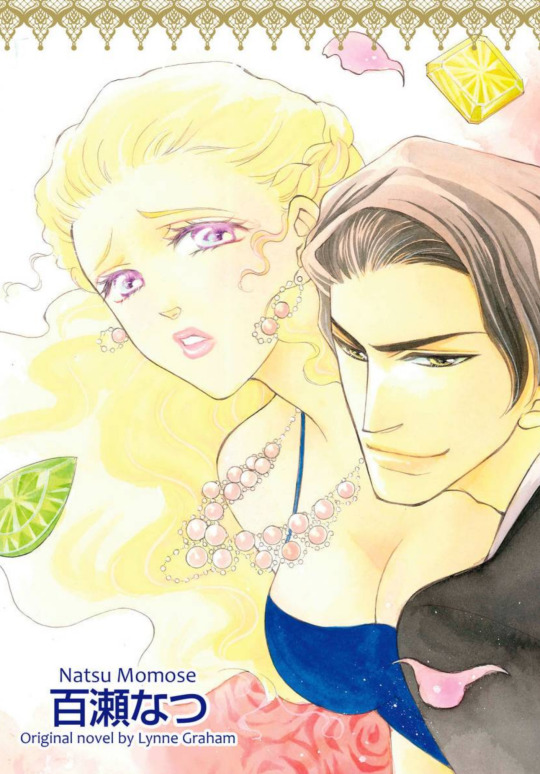
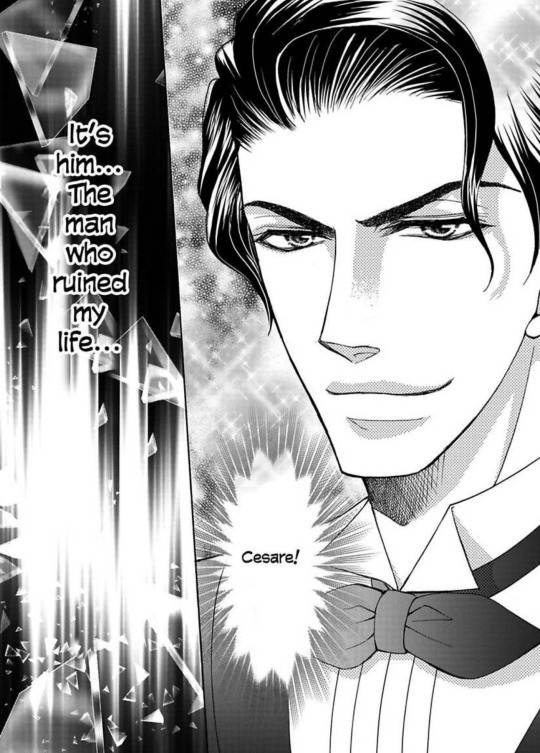
Cesare Falcone and his lover — The manga adaptation left out a lot of stuff, but it sure visually captured his jerkass energy perfectly. Don't let his orange status 🟠 fool you into thinking he's less of a cruel hero. This dude, not even a dark romance MMC, told his wife he would kill her if she cheated on him. Maybe he was bluffing, but still... yikes.
Billionaires are the dukes of contemporary romance, and vice versa (historical romance).
All of these guys got a HEA.
Top = Most Problematique
⚫ Richard Payne (Dark Obsession series by Zoe Blake)
Known for gaslighting his object of obsession into believing she was "actually" in the 19th century.
⚫ Gage Channing (The Devil's Kiss series by Gemma James)
Blackmailed the heroine to become his slave, or else he would have turned her over to the police and not paid for her sickly daughter's cancer treatment if she hadn't given in to his demands.
⚫️ Drew Kelley (The Underestimated series by Jettie Woodruff)
Abused his wife for 6 years over something that wasn't her fault.
⚫ Tony Rawlings (Consequences series by Aleatha Romig)
The man was a woman's worst nightmare.
He influenced the course of FMC's life for years, since she was a college sophomore (about 19 years old). His plans led to her abduction at the age of 26.
⚫ Joshua Smith (Tamara, Taken by Ginger Talbot)
A sadistic, billionaire/serial killer.
⚫ Quincy "Q" Mercer (Monsters in the Dark series by Pepper Winters)
🔴 Calvin Cutler (Descent by Sam Marino)
Abducted her cat.
🔴 Jesse Ward (This Man series by Jodi Ellen Malpas)
🔴 Nicholas Challoner (The Guarded Heart by Robyn Donald)
A proto-dark romance MMC?
Blackmailed the heroine into marrying him/ becoming his brood mare.
🔴 Nikolas Constantinos (All That Glitters by Linda Howard)
Also something of a proto-dark romance MMC. And the word "no" doesn't exist in his dictionary. FMC tried to escape him, but he caught her; "I would have had you back within two days at the most."
🔴 Gray Rutherford (Kiss From A Rose by Maya Alden)
Emotionally abused and neglected his wife to the point where she became suicidal. He treated her poorly for 20 years.
🔴 James Roth (Singed series by Mia Knight)
Blackmailed his ex-wife into remarrying him. He treats her like she's his possession.
🔴 Milo Sinclair (Quarantine series by Drethi Anis)
A parental figure/legal guardian–dependant relationship mixed with romance and addiction. Makes for a very toxic dynamic.
🔴 Sebastian Everett (Virtue & Vanity by Astrid Jane Ray)
His wife was completely terrified of him — and not in a fun, she-secretly-digs-that kind of way.
🔴 Callum McCord (Liars Like Us by J.T. Geissinger)
Manipulated FMC's life for five years, creating her dire financial situation to make her accept his marriage of convenience proposal. As if that wasn't bad enough, he recorded their marriage in Vatican City — trapping her! Divorce is illegal there.
🟠 Miles Osborne (Everything for Her by Alexa Riley)
Started orchestrating the heroine's life after meeting her as a high schooler. He was five years older than her.
🟠 Lucio Masterton (At the Spaniard's Convenience by Margaret Mayo)
Destroyed FMC's small company — her life work that she ran for about 15 years — to make her dependent on him. He won.
🟠 Mark Walker (Faithless Duet by Skyler Mason)
Cheated on his wife for 15 years out of spite.
🟠 Zack King (The Land Where Sinners Atone by V.F. Mason)
Had the FMC beaten to a pulp in prison, and stole her baby. He never apologized for the latter. Did not grovel.
🟠 Scott Blackstone (You Can Have Manhattan by P. Dangelico)
This man's the only MMC here that I hate. A lot. I'm still upset about the crappy cabin, and his public slandering of FMC. >:c
🟠 Noah Carter (Best Served Cold by Maya Alden)
Made a sex tape with FMC — without her knowledge — to blackmail her father. As a result, he ruined her life, and she lost her home.
🟠 Cesare Falcone (A Savage Betrayal by Lynne Graham)
Harlequin Presents sure loves its vengeful, Mediterranean billionaire heroes!
Isolated FMC at his castle home in Sicily, which was several miles away from the nearest village.
🟠 Killian Spencer (A Vow of Hate by Lylah James)
Repeatedly called the scarred heroine "beasty".
🟠 Christian Grey (Fifty Shades)
Many of the guys on this list make Grey look tame.
🟠 Preston Parker (Two Weeks Notice by Whitney G.)
FMC, who was also Preston's executive assistant, tried quitting her job on account of his bosshole ways — but she couldn't, since he had her sign a contract with an "indefinite employment term" fine-print clause written in white ink. What's more, every bonus she accepted added an additional year to the contract.
🟡 Hudson James (Say You Love Me by Sabre Rose)
Blamed his wife for their baby's death (as if he hadn't played a part in it), making her miserable. This couple's problems were solved with... cuckolding.
🟡 Sandro De Lucci (The Unwanted Wife by Natasha Anders)
The heroine attacked him, and he totally deserved it. Why did she do it? He blamed her for her miscarriage.
🟡 Bryce Palmer (A Husband's Regret by Natasha Anders)
Told his wife that he "never really loved her". He said it to hurt her.
🟡 Bram Gage (Going Nowhere Fast by Kati Wilde)
Considered FMC a bad influence on his sister. He was such an asshole about it.
🟡 Aristide Kourous (The Greek's Christmas Baby by Lucy Monroe)
Wouldn't believe his wife! >:c
Bottom = Least Problematique
7 notes
·
View notes